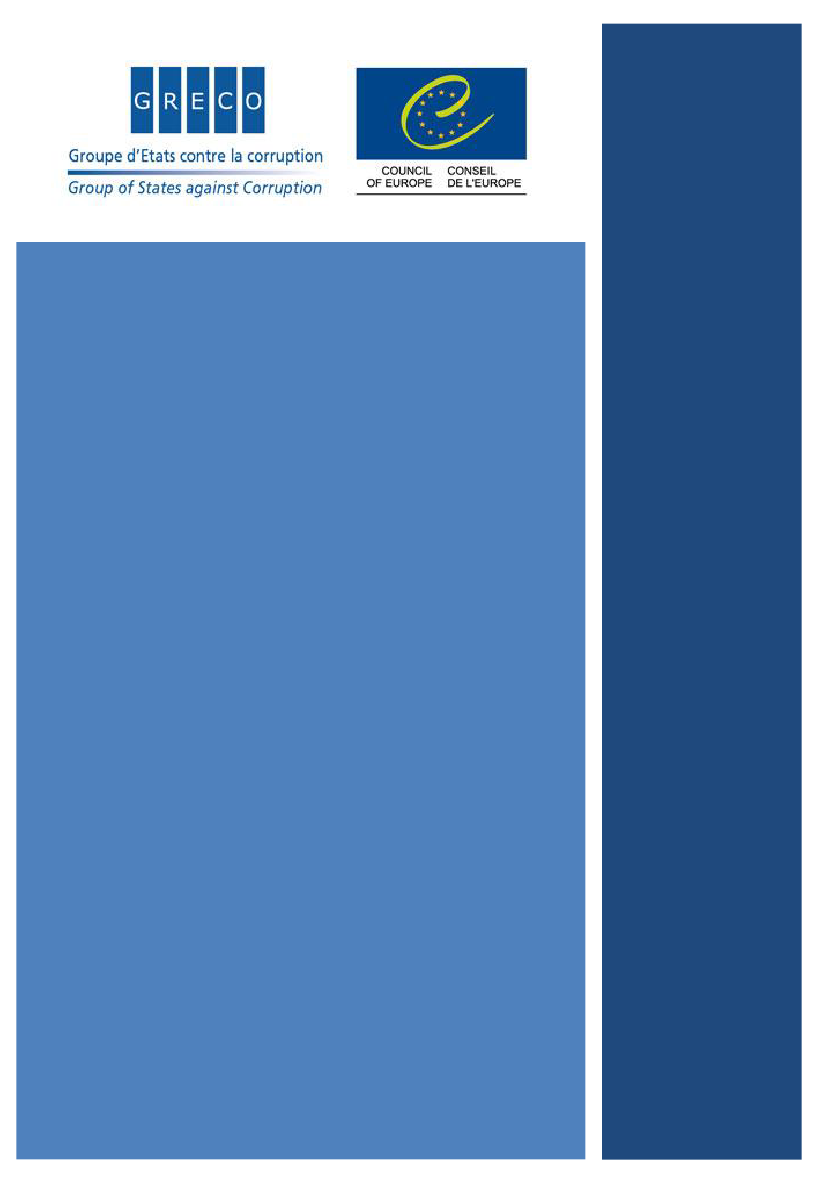Retsudvalget 2013-14
REU Alm.del Bilag 199
Offentligt
28 March 2014
ConfidentialGreco Eval IV Rep (2013) 6E
FOURTHEVALUATIONROUND
FOURTH EVALUATION ROUNDCorruption prevention in respect of members ofparliament, judges and prosecutors
EVALUATION REPORTDENMARK
Adopted by GRECO at its 63rdPlenary Meeting(Strasbourg, 24-28 March 2014)
1
2
TABLE OF CONTENTSEXECUTIVE SUMMARY .....................................................................................................................................4I.II.III.INTRODUCTION AND METHODOLOGY .....................................................................................................5CONTEXT ..................................................................................................................................................7CORRUPTION PREVENTION IN RESPECT OF MEMBERS OF PARLIAMENT ..................................................8OVERVIEW OF THE PARLIAMENTARY SYSTEM................................................................................................................. 8TRANSPARENCY OF THE LEGISLATIVE PROCESS............................................................................................................... 9REMUNERATION AND ECONOMIC BENEFITS................................................................................................................. 10ETHICAL PRINCIPLES,RULES OF CONDUCT AND CONFLICTS OF INTEREST............................................................................. 12CONFLICTS OF INTEREST.......................................................................................................................................... 13PROHIBITION OR RESTRICTION OF CERTAIN ACTIVITIES................................................................................................... 14Gifts ............................................................................................................................................................. 14Incompatibilities and accessory activities, post-employment restrictions ................................................... 14Financial interests, contracts with State authorities, misuse of public resources, third party contacts ...... 15Misuse of confidential information ............................................................................................................. 15DECLARATION OF ASSETS,INCOME,LIABILITIES AND INTERESTS....................................................................................... 16SUPERVISION AND ENFORCEMENT............................................................................................................................. 18ADVICE,TRAINING AND AWARENESS......................................................................................................................... 19IV.CORRUPTION PREVENTION IN RESPECT OF JUDGES ............................................................................... 20OVERVIEW OF THE JUDICIAL SYSTEM.......................................................................................................................... 20RECRUITMENT,CAREER AND CONDITIONS OF SERVICE................................................................................................... 22CASE MANAGEMENT AND PROCEDURE....................................................................................................................... 25ETHICAL PRINCIPLES,RULES OF CONDUCT AND CONFLICTS OF INTEREST............................................................................. 26PROHIBITION OR RESTRICTION OF CERTAIN ACTIVITIES................................................................................................... 27Incompatibilities and accessory activities, post-employment restrictions ................................................... 27Recusal and routine withdrawal .................................................................................................................. 28Gifts ............................................................................................................................................................. 29Third party contacts, confidential information ............................................................................................ 29Declaration of assets, income, liabilities and interests ................................................................................ 29SUPERVISION AND ENFORCEMENT............................................................................................................................. 30Supervision of accessory activities ............................................................................................................... 30Disciplinary and criminal proceedings ......................................................................................................... 30Statistical information ................................................................................................................................. 31ADVICE,TRAINING AND AWARENESS......................................................................................................................... 32V.CORRUPTION PREVENTION IN RESPECT OF PROSECUTORS .................................................................... 33OVERVIEW OF THE PROSECUTION SERVICE.................................................................................................................. 33RECRUITMENT,CAREER AND CONDITIONS OF SERVICE................................................................................................... 34CASE MANAGEMENT AND PROCEDURE....................................................................................................................... 35ETHICAL PRINCIPLES,RULES OF CONDUCT AND CONFLICTS OF INTEREST............................................................................. 36PROHIBITION OR RESTRICTION OF CERTAIN ACTIVITIES................................................................................................... 37Incompatibilities and accessory activities, post-employment restrictions ................................................... 37Recusal and routine withdrawal .................................................................................................................. 38Gifts ............................................................................................................................................................. 39Third party contacts, confidential information ............................................................................................ 39DECLARATION OF ASSETS,INCOME,LIABILITIES AND INTERESTS....................................................................................... 40SUPERVISION AND ENFORCEMENT............................................................................................................................. 40Internal review ............................................................................................................................................. 40Disciplinary and criminal proceedings ......................................................................................................... 40Oversight by the Parliamentary Ombudsman ............................................................................................. 41ADVICE,TRAINING AND AWARENESS......................................................................................................................... 42VI.RECOMMENDATIONS AND FOLLOW-UP ................................................................................................. 43
3
EXECUTIVE SUMMARY1.Public perception of the level of corruption in Denmark has historically been verylow. Corruption prevention – including with respect to members of parliament, judgesand prosecutors – relies to a large degree on trust, openness and public scrutiny andappears to be quite effective in practice. Integrity levels of all categories of personsunder review seem to be high. Moreover, GRECO identified several strong structuralpoints – for example, the independence of the judiciary was further strengthened in 1999by the establishment of several bodies such as the Court Administration and the JudicialAppointment Board and appears to be exemplary. Additional activities by judges areclosely regulated. Ethical questions are included in the training offered to judges andprosecutors.2.That said, GRECO is of the opinion that the current system based on trust mightnot always provide sufficient safeguards against corruption risks in the future, and itwishes to stress that the risks related to conflicts of interest must not be underestimated.The present report includes recommendations – as well as several further suggestions –aimed at raising awareness among members of parliament, judges and prosecutors ofsuch risks, further enhancing transparency and public trust in them and the institutionsthey represent.3.GRECO has identified areas in corruption prevention among members ofparliament where there is room for improvement. In particular, it is recommended that acode of conduct be established, thatad hocdisclosure of actual and potential conflicts ofinterest be required, regular public registration of the occupations and financial interestsbe made mandatory and enforcement of the rules be ensured. Such measures should beseen as safeguards for ensuring that the parliamentary process is free from – and seento be free from – improper external influence.4.Turning to judges and prosecutors, the development, dissemination andpublication of sets of clear ethical standards/codes of conduct – tailor-made for bothprofessions – are recommended, coupled with complementary measures for theirimplementation, including dedicated training. It is crucial that such training is alsoprovided to expert judges and lay judges, who play an important role in the judicialsystem.
4
I.
INTRODUCTION AND METHODOLOGY
5.Denmark joined GRECO in 2000. Since its accession, Denmark has been subject toevaluation in the framework of GRECO’s First (in February 2002), Second (inSeptember 2004) and Third (in December 2008) Evaluation Rounds. The relevantEvaluation Reports, as well as the subsequent Compliance Reports, are available onGRECO’s homepage (www.coe.int/greco).6.GRECO’s current Fourth Evaluation Round, launched on 1 January 2012, dealswith “Corruption prevention in respect of members of parliament, judges andprosecutors”. By choosing this topic, GRECO is breaking new ground and is underliningthe multidisciplinary nature of its remit. At the same time, this theme has clear links withGRECO’s previous work, notably its First Evaluation Round, which placed strong emphasison the independence of the judiciary, the Second Evaluation Round, which examined, inparticular, the public administration, and the Third Evaluation Round, which focused onthe incriminations of corruption (including in respect of parliamentarians, judges andprosecutors) and corruption prevention in the context of political financing.7.Within the Fourth Evaluation Round, the same priority issues are addressed inrespect of all persons/functions under review, namely:ethical principles, rules of conduct and conflicts of interest;prohibition or restriction of certain activities;declaration of assets, income, liabilities and interests;enforcement of the applicable rules;awareness.
8.As regards parliamentary assemblies, the evaluation focuses on members ofnational parliaments, including all chambers of parliament and regardless of whether themembers of parliament are appointed or elected. Concerning the judiciary and otheractors in the pre-judicial and judicial process, the evaluation focuses on prosecutors andon judges, both professional and lay judges, regardless of the type of court in which theysit, who are subject to national laws and regulations. In preparation of the presentreport, GRECO used the responses to the Evaluation Questionnaire (Greco Eval IV (2013)6E) by Denmark, as well as other data, including information received from civil society.In addition, a GRECO evaluation team (hereafter referred to as the “GET”), carried out anon-site visit to Denmark from 9-13 September 2013. The GET was composed of Mr ErnstGNAEGI, Head of the International Criminal Law Unit, Federal Office of Justice(Switzerland), Mrs Alexandra KAPIŠOVSKÁ, Legal Adviser, Ministry of Justice (SlovakRepublic), Mr Jens-Oscar NERGÅRD, Senior Adviser, Ministry of Local Government andModernisation (Norway) and Ms Angelina SARANOVIC, Advisor in the Committee onTourism, Agriculture, Ecology and Spatial Planning, Parliament of Montenegro(Montenegro). The GET was supported by Michael JANSSEN from GRECO’s Secretariat.9.The GET held interviews with representatives of the Ministry of Justice, the CourtAdministration, the Maritime and Commercial Court, the Eastern High Court, the DistrictCourt of Copenhagen, the Appeals Permission Board, the Supreme Court, the SpecialCourt of Indictment and Revision, the External Activity Board, the Judicial AppointmentCouncil, the Director of Public Prosecutions, the State Prosecutor in Copenhagen, theCommissioners in Copenhagen and in North Zealand, the State Prosecutor for SeriousEconomic and International Crime. The GET also interviewed a representative of theParliamentary Ombudsman, the Speaker of theFolketing(the national Parliament) andother members of theFolketingand its Presidium, as well as officials of theFolketingAdministration, namely the Legal Services Office, the Committees’ Secretariat, theFinancial Department, the Personnel Office and the Communication Department. Finally,the GET spoke with representatives of the Association of Danish Judges and theAssociation of Danish Assistant Judges, the Association of Public Prosecutors,5
Transparency International Denmark, the Association of Danish Media, the AalborgUniversity (Department of Law), the Confederation of Danish Industry and the DanishBar and Law Society.10.The main objective of the present report is to evaluate the effectiveness ofmeasures adopted by the authorities of Denmark in order to prevent corruption inrespect of members of parliament, judges and prosecutors and to further their integrityin appearance and in reality. The report contains a critical analysis of the situation in thecountry, reflecting on the efforts made by the actors concerned and the results achieved,as well as identifying possible shortcomings and making recommendations for furtherimprovement. In keeping with the practice of GRECO, the recommendations areaddressed to the authorities of Denmark, which are to determine the relevantinstitutions/bodies responsible for taking the requisite action. Within 18 months followingthe adoption of this report, Denmark shall report back on the action taken in response tothe recommendations contained herein.
6
II.
CONTEXT
11.GRECO’s 2002 First Round Evaluation Report states that “Denmark appears tohave very little corruption. (…) Denmark has addressed its concern about keepingcorruption at bay by clearly heeding all international legal standards in the anti-corruption field and implementing them in the national legislation as well as within publicadministration.”1This overall evaluation has been confirmed by recent internationalstudies.212.Public perception of the level of corruption in Denmark has historically been verylow. Denmark has been listed among the four least corrupt countries on TransparencyInternational’s yearly corruption perception index (CPI) since 1995, the year it was firstpublished. In 2012 and 2013, Denmark was ranked first. In line with the CPI, rule of lawand control of corruption have been ranked at the higher end of the World Bankgovernance indicators for almost a decade.313.Turning more specifically to the areas covered by GRECO’s Fourth EvaluationRound, it would appear that, over the last decade, public trust in the Parliament and inpolitical parties has been constantly higher in Denmark than in most other countriessurveyed for the European Commission’s Eurobarometer.4Similarly, the percentage ofthose surveyed who think that corruption is widespread among politicians in Denmarkwas 38% in 2013, as compared to the EU average (56%).5As far as the judiciary isconcerned, according to the Eurobarometer on corruption, the percentage of thosesurveyed who think that corruption is widespread in this branch of power (9%) is clearlybelow the EU average (32%).6Moreover, the judiciary is said to be the most trustedinstitution in Denmark.14.While the Danish system has gained the confidence of the citizens in such crucialinstitutions as Parliament and the judiciary, the GET still sees room for improvement inthe regime for preventing corruption – and it wishes to ally itself with the followingstatements made in GRECO’s Second Round Evaluation Report which fit well with theimpressions it gained during the Fourth Round on-site visit: “At all levels of Danishsociety (public administration, private business, associations, scientific community or themedia), the general opinion is that corruption has no chance in Danish society. There is acommon conviction that even changes in moral attitudes and the evolution towards amore diversified society with different moral and ethical roots will not be a challenge totraditional Danish values with regard to corruption. The GET hopes that this certainty willnot cause a false sense of security, and that people will remain aware of the dangers ofcorruption. In any case, formulating some more binding rules on the prevention ofcorruption and on avoiding conflicts of interest will strengthen this stable base.”7
12
See document Greco Eval I Rep (2002) 6E, paragraphs 100/102/103.See, in particular, the National Integrity System Assessment on Denmark, Transparency International (2011),and the Sustainable Governance Indicators (SGI) (2011) Denmark Report by Bertelsman Stiftung.3Seehttp://info.worldbank.org/governance/wgi/sc_chart.asp4Seehttp://ec.europa.eu/public_opinion/cf/step1.cfm,under “Trust in Institutions”.5Special Eurobarometer on corruption 397 (published in February 2014).6Special Eurobarometer on corruption 374 (published in February 2012).7See document Greco Eval II Rep (2004) 6E, paragraph 64.
7
III.
CORRUPTION PREVENTION IN RESPECT OF MEMBERS OF PARLIAMENT
Overview of the parliamentary system15.Denmark is a constitutional monarchy and parliamentary democracy. Under the1953 Constitution, the Danish Parliament (Folketing) is tasked to enact legislation,exercise control of the Government, adopt the State's budgets and take part ininternational co-operation. TheFolketingis a unicameral assembly comprised of 179members (MPs) who are elected directly under a proportional representation system.Two MPs are elected in each of the autonomous territories of Greenland and the FaroeIslands. Parliamentary elections are held at least every four years, but it is within thepowers of the Prime Minister to ask the Queen to call for an election before the term haselapsed. The Constitution sets out certain basic principles for parliamentary elections.More detailed provisions are contained in the Parliamentary Elections Act8which alsoregulates MPs’ remuneration, pension and other emoluments. The internal workings oftheFolketingare specified in greater detail in the Standing Orders.16.Article 56 of the Constitution states that “members of theFolketingare boundsolely by their convictions and not by any directions from their electors.” From a legalperspective, therefore, it is left entirely to each individual MP to determine if s/he shouldrepresent the national public interest or more particular interests, e.g. those of her/hisconstituency or those of a party. The authorities indicate however that, in practice, partyloyalty is very strong and in the vast majority of cases MPs vote along party lines.17.An MP may voluntarily give up her/his mandate at any time for any reason but canonly be compelled to do so if convicted of an act which in the eyes of the public makesher/him unworthy of being an MP. It is up to theFolketingitself to determine – by aplenary vote – if an act for which an MP has been convicted in a court makes her/himunworthy. Since 1980 there have been two cases where such plenary votes have beenheld. In 1991 an MP lost his seat after having been convicted of criminal offences and in1983 an MP lost his seat after having been convicted of tax offences. Since 1980, somesimilar cases had not been put to a vote because, for example, the MPs in question hadvoluntarily given up their seat. If an MP gives up or loses her/his mandate or dies,substitute members are called in to take up the vacant mandate. Substitutes may also becalled in temporarily if a permanent MP is granted a leave of absence.18.There are 26 standing committees, most of which have spheres of competencethat roughly mirror those of the Government ministers. The standing committees have29 members each, except the Standing Orders Committee which has 21, and theScrutineers’ Committee, the Finance Committee and the Naturalisation Committee whichhave 17 members each. In principle, seats in the standing committees are allocatedproportionally between the party groups in theFolketing;in practice, the party groupsform two large blocks between which committee seats are allocated proportionally.Within each block, committee seats are divided between the party groups according topolitical agreements.19.TheFolketingelects a Speaker and four Deputy Speakers from among itsmembers for each parliamentary session. The main responsibilities of the Speaker are toprovide optimal conditions for parliamentary work, to ensure that parliamentary sessionsare properly conducted and that MPs have favourable working conditions. The Speaker isalso head of the Administration of theFolketingwhich employs about 440 people. TheSpeaker and the Deputy Speakers jointly constitute the supreme authority in theFolketing,called the Presidium.
8
Elections in Greenland and the Faroe Islands follow slightly different rules laid down in two separate Acts.
8
20.There are three special institutions which are affiliated with and funded by theFolketingbut work independently of theFolketing.Neither the Government nor theFolketingcan influence their work. Firstly, the Auditor General’s Office headed by theAuditor General – who is appointed by the Speaker of theFolketingwith the consent ofthe Standing Orders Committee on the recommendation of the Public AccountsCommittee – which audits the State's accounts. Second, the Public Accounts Committee,whose six members are appointed by theFolketingand which reviews the annual reportof the Auditor General’s Office and presents its findings to theFolketing.Third, theOmbudsman, who is elected by theFolketingand who exercises control over State,municipal and other public administrative authorities – with the exception of the judiciary– on behalf of theFolketing.The Ombudsman investigates complaints by citizens andalso takes up cases on his own initiative (such as issues which have attracted mediafocus) and regularly visits public institutions.Transparency of the legislative process21.All MPs are entitled to introduce bills and proposals for other decisions that theFolketingmust consider (however, the latter can decide by a simple majority in a plenaryvote to dismiss a bill or other proposal). Nonetheless, in practice the vast majority of billsintroduced in theFolketing,and the overwhelming majority of bills passed, areGovernment bills. As part of the preparatory work on Government bills, the responsibleministry normally carries out a public consultation9on a draft bill, which in most cases isthe first time that a full draft for new legislation is made accessible to the public (on theinternet). Public consultation on a draft bill generally involves sending the draft to arange of authorities, organisations, businesses, etc. believed to have a particular interestin the subject-matter, inviting them to provide the responsible ministry with anycomments they may have within a certain timeframe. In principle, any person or entitycan comment on the draft by writing to the responsible ministry. At the same time as aGovernment bill is introduced in theFolketing,the responsible ministry normally submitsthe comments received during public consultation to the relevant standing committeewith a written statement containing the views of the ministry on the various comments.22.According to the non-binding “Guidelines for quality in legislation” published by theMinistry of Justice, the timeframe for public consultation must be adapted to thecircumstances of each case, but should be sufficiently long to allow consulted parties toproduce an adequate reply. However, during the on-site visit various interlocutorsincluding MPs shared with the GET their concerns about the fact that in practice,consultation periods are often very short, thus undermining the tradition of civil societyorganisations and stakeholders contributing to legislative work which may narrow thefoundation for political decision-making. MPs interviewed by the GET were aware of theproblem but no political agreement has yet been reached on reforms. After the visit, theauthorities indicated that in the 2012-2013 parliamentary session the consultationperiods had improved (in particular, the average consultation period was 27 days ascompared to 21 and 22 days in the previous sessions), and that since December 2013,the Ministry of Justice has recommended that the date of submission of a draft bill forconsultation and the deadline for the consultation period (or, in cases where a draft bill isnot submitted for consultation prior to the bill being put before Parliament, the reason)should be included in the explanatory memorandum to a bill. The GET welcomes thesedevelopments and encourages the authorities to persist in their efforts to further enlargethe public consultation periods to ensure that they are sufficiently long in practice, asrequired by the above-mentioned guidelines. In the view of the GET, in addition toexpanded periods, fixed time periods would be preferable, for the sake of clarity andtransparency of the legislative process.
9
Public consultation is provided for in non-binding Government guidelines for quality in legislation and is,according to the authorities, widely seen as an integral part of the legislative process.
9
23.As soon as a bill is introduced in theFolketing,it is made public on the website oftheFolketing(www.ft.dk) and in the electronic Report of Danish ParliamentaryProceedings (www.folketingstidende.dk).24.Plenary sessions in theFolketingare in principle open to the public. TheConstitution and the Standing Orders provide that plenary sessions may be heldincamera,but this option has never been used under the current Constitution. Members ofthe public may hear a session from the visitors’ gallery to the extent that seating isavailable. Plenary sessions are broadcast on the website and on the television channel oftheFolketing.Meeting reports and voting records – including the votes of each individualmember – can be viewed either on the website or in the electronic Report of DanishParliamentary Proceedings.25.As a rule, committee meetings are heldin camera,but the committees may decideto hold them openly. In particular, consultations with ministers are often open to thepublic (upon prior registration and within the limits of available seating) and broadcast onthe website and/or on theFolketing’sown television channel.10During the interviews, theGET was informed that more generally, many committee meetings are public.Committees may invite anyone – including lobbyists – they deem suitable to impart theirviews on the matter at hand. The composition of committees at any given time andagendas for ordinary committee meetings are transparent and can be found on theparliamentary website. Information on the members present at a particular meeting isnot available, but the names of experts heard and proposals discussed will often beapparent from the meeting agenda. When a committee refers a bill or other proposalback to the plenary, it does so in the form of a report that contains therecommendations, proposed amendments and often detailed political remarks of theparty groups in the committee. The report is made public and can be found on thewebsite at least two days prior to the subsequent plenary reading.26.While it is widely recognised that openness and transparency of State institutionsare an important part of the Danish culture – and media representatives reported to theGET that overall conditions for doing investigative work were good – the GET’s attentionwas repeatedly drawn to certain restrictions on access to information. In particular,several interlocutors were concerned that certain provisions of the recently adoptedAccess to Public Information Act, which triggered significant public protest, may preventthe media and the public at large from gaining the necessary insight into public decision-making and from acting as public watchdogs. Interalia,it was mentioned that under thenew legislation the exchange of documents between MPs and ministers in mattersconcerning legislation and other “corresponding political processes” will not be accessibleto the public. In this connection, the GET was interested to hear that the ParliamentaryOmbudsman has been tasked with assessing the application of the new legislation, whichwill enter into force in January 2014, over a period of three years. Given the importantrole of the public in the control of State institutions in the Danish system, the GETencourages the authorities to keep the legislation on access to information under reviewin order to ensure that such access is not unduly restricted.Remuneration and economic benefits27.According to Statistics Denmark, in 2011 the average gross salary (“standardcalculated monthly earnings”) in Denmark was 38,090.47 DKK/approximately 5,100 EURper month.28.An MP currently receives a taxable base remuneration of 50,083DKK/approximately 6,700 EUR per month. The Speaker of theFolketingreceives the10
The television channel, known simply asFolketinget,is broadcast free-to-air in Denmark as well as being partof the basic packages of all major Danish cable TV operators.
10
same (taxable) remuneration as the Prime Minister, i.e. 1,458,214 DKK/approximately195,400 EUR per annum in 2012. In addition to the aforementioned basic remuneration,each MP – including the Speaker – receives a tax-free so-called cost allowance of 4,962DKK/approximately 660 EUR11per month. The cost allowance is intended as a fixed andsimple allowance to cover a range of minor costs associated with the work of an MP.From a legal perspective there is no obligation on an MP to work for a specified amountof time.29.TheFolketingprovides flats within its premises free of charge and free of tax tothe Speaker and the Deputy Speakers. Other MPs who are not domiciled in the Zealandarea are entitled either to a flat provided free of charge and free of tax or to tax-freereimbursement of the cost – up to 73,223 DKK/approximately 9,810 EUR per annum – ofa second home in the greater Copenhagen area. Such costs must be accounted forannually. In addition, such MPs receive DKK 29,290/approximately 3,920 EUR per annumas a fixed, tax-free allowance for the additional costs of keeping two homes. Other MPsare entitled to reimbursement of up to 12 nights’ hotel accommodation in Copenhagen,per calendar year, in connection with meetings etc. in theFolketing.Finally, an MP isentitled to reimbursement of up to 12 nights’ hotel accommodation, in his/herconstituency, per calendar year and subject to certain restrictions. In all cases, hotelcosts are only reimbursed on the basis of supporting documentation and up to DKK1,025/approximately 140 EUR per night (DKK 1,160 in the Faroe Islands).Reimbursements are tax-free.30.MPs are provided, upon request, with a first-class rail and bus pass which theymay use freely for travel within Denmark for their political work as well as for personalpurposes (in the latter case, it is taxable). MPs are reimbursed for domestic flights inconnection with their political work. For travel within Denmark, theFolketingmaintains arestrictive and quite detailed policy on reimbursement for taxi rides or distances drivenby the MPs themselves in their own cars. When MPs travel abroad in an official capacity,e.g. as members of parliamentary delegations, their travel and accommodation expensesas well as travel insurance are paid entirely by theFolketing.Most of the travel benefitsare tax-free.31.MPs are granted technological equipment consisting of a laptop computer, internetaccess from home, a tablet computer and a mobile phone, which may be used forpersonal as well as political purposes.32.MPs begin to accrue pension rights (taxable) after one year’s membership of theFolketing.The pension rights accrued reach a maximum of 57 per cent of the baseremuneration after 20 years’ membership.33.If an MP leaves theFolketingfollowing an election or due to illness, s/he cancontinue to collect an amount equal to the base remuneration (“post-remuneration”) forbetween 12 to 24 months, depending on the duration of the membership. However,income from other sources is deducted from the post-remuneration, with the exception ofincome from other sources up to 100,000 DKK/approximately 13,400 EUR in the first 12months after having left theFolketing.The former MP is also entitled to coverage – freeof tax – of costs for adult education, for the same period of time, up to a maximumamount of 20,000 DKK/approximately 2,700 EUR per year of membership or up to a totalof 100,000 DKK/approximately 13,400 EUR (whichever amount is lower).34.TheFolketingprovides MPs (and the staff of party groups) with office space,furniture, technological equipment, etc. The individual MPs receive no public funds foroffice budgets. They are allowed to use private means to run their offices and are notrequired to report on such expenditure. During the interviews, the GET was however11
6,616 DKK/approximately 880 EUR for MPs elected in Greenland or the Faroe Islands.
11
informed that such private support was not common, MPs questioned on the subjectwere not aware of any such cases.35.Parliamentary party groups receive public funds (party group grants) which aremostly used to pay the staff employed by the party groups. They are composed of a baseamount for each party group (in 2013, 286,758 DKK/approximately 38,430 EUR permonth)12and an amount per member (44,962 DKK/approximately 6,020 EUR permonth).13Use of party group grants is governed by a set of rules issued by the StandingOrders Committee and party groups must provide annual accounts of their use of thegrants to the Presidium of theFolketing.The accounts are reviewed by external auditingfirms and published on the website of theFolketing.The party groups are not barredfrom supplementing their party group grants with funding from external sources.Ethical principles, rules of conduct and conflicts of interest36.Some general principles can be found in the Constitution – according to which MPsare bound solely by their convictions,14in the Standing Orders – according to which theSpeaker has to ensure that order is maintained and that the form of parliamentarydebates is “sufficiently dignified”,15and in the provisions of the Criminal Code (CC) onoffences committed in the execution of public office – which also apply to MPs, with a fewexceptions. There is, however, no distinct set of written ethical principles or standards ofconduct for MPs.37.Integrity standards among MPs appear to be high and until recently, MPs had notconsidered it necessary to establish a code of conduct, nor had there been any significantor sustained calls for such a tool from other stakeholders. However, the GET wasinterested to hear that the drawing up of a code of conduct for MPs had been brieflycontemplated recently in light of GRECO evaluations of other member States. In recentdiscussions, the Presidium of theFolketinghas generally viewed the idea of compilingsuch a code – possibly inspired by codes developed in countries with a comparablecultural and political background – positively. The GET is in favour of theFolketinghavinga comprehensive set of ethical and conduct standards, drawn up and published by MPsthemselves – or at least with their participation. The GET is of the firm opinion that theprocess of developing a code of conduct would further raise awareness among MPs of theethical dimensions of their status as elected representatives, provide them with guidanceand demonstrate to the public their willingness to act in order to uphold high levels ofintegrity. The rule of law and public confidence in parliamentary institutions can beenhanced when citizens know what conduct they should be able to expect from theirelected representatives.38.Regarding the content of a code of conduct, the GET takes due note of the positionexpressed by the Presidium of theFolketingthat such a document should primarily serveto raise awareness of MPs of key ethical questions rather than imposing overly specific orimperative rules, which would risk leading to complacency and formalism. In the view ofthe GET, the code will have to contain and make more appropriately accessible the basicstandards concerning the fundamental duties of MPs and restrictions on their activity. Atthe same time, however, given the fact that the legal framework is rather vague, and inorder for it to be a meaningful tool in the hands of MPs, it is crucial that the codeprovides clear guidance on the prevention of conflicts of interest and on related keyissues, such as the acceptance of gifts and other advantages, misuse of information andof public resources and interaction with third parties such as lobbyists (includingelaborated examples). The current absence of standards is, for instance, evident when it1213
For any party group of four members or more – smaller groups receive proportionally less.For the Speaker of theFolketingor for a member who is also a minister it is 14,988 DKK/approximately2,010 EUR.14See article 56 of the Constitution and paragraph 16 above.15See, in particular, section 4 (2) of the Standing Orders.
12
comes to MPs’ behaviour in cases of conflicts of interest, which is completely left to theindividual ethics and discipline of the MPs concerned (see below). Similarly, there are norules on the acceptance of gifts and other advantages, except for the general briberyprovisions of the CC (article 144). Neither the CC nor any other legal instrument giveclear indications on what kind of gifts or other advantages MPs can accept, and there isno set procedure for returning or disposing of unwanted gifts. While it is apparently notusual for MPs to be offered and to accept gifts, and MPs are quite reluctant to accepteven minor advantages (mainly due to media interest in such matters), the GET heardthat the media have reported allegations that some MPs have accepted undisclosedadvantages such as trips and invitations to cultural events, paid for by privatecontractors. The GET believes that it is crucial that the parliamentary process is not onlyfree from improper external influence, but that it is also seen to be so by the generalpublic. Clear guidance on the handling of gifts and other advantages would therefore bebeneficial to MPs and their reputation as elected representatives, as well as to gift-givers.39.Furthermore, the GET is of the opinion that the code of conduct has to addressquestions relating to MPs’ contacts with lobbyists and other third parties who seek toinfluence the parliamentary process. The GET was informed that whether to regulatelobbying has been discussed several times over the years. In October 2012, MPs weregiven the possibility to register contacts with lobbyists, organisations, businesses etc.under a specific category in the voluntary register of occupations and financial interests(see below). However, the system was abandoned again shortly afterwards, mainlybecause MPs found it excessively burdensome to record their contacts adequately anddifficult to determine if a contact was significant enough to be registered. Instead, MPscan now have a link on the parliamentary website to their personal or party websiteswhere they can describe contacts with lobbyists etc., providing as much detail as theydeem appropriate. During the interviews held on site, it was stressed that in Denmarklobbying is generally seen as a necessary and positive phenomenon, providing law-makers with useful information and expertise, and that it is part of the political cultureand tradition that MPs are highly accessible to the public and are free to have contactswith whomever they wish as part of their political work. That said, the GET notes thataccording to some interlocutors discussions about possible undue forms of influence andconflicts of interest of politicians have only started and need to be stimulated. The GETshares this view and is convinced that the code of conduct needs to also provideguidance on how to deal with third parties seeking to obtain undue influence on MPs’work and to actively promote transparency in this area (e.g. by way of the above-mentioned voluntary disclosure of contacts by MPs).40.In addition to the guidance provided by the code of conduct itself, complementarymeasures – in due course, following the drafting of the code – such as the provision ofspecific training or confidential counselling on the above issues and on the code as awhole would be a further asset. Given the preceding paragraphs and in line with GuidingPrinciple 15 of Resolution (97) 24 of the Committee of Ministers of the Council of Europeon the twenty guiding principles for the fight against corruption,GRECO recommends(i) that a code of conduct for members of parliament – including,inter alia,guidance on the prevention of conflicts of interest, on questions concerninggifts and other advantages and on how to deal with third parties seeking toobtain undue influence on MPs’ work – be adopted and made easily accessibleto the public; and (ii) that it be complemented by practical measures for itsimplementation, such as dedicated training or counselling.Conflicts of interest41.There is no general definition of a conflict of interests. Furthermore, the currentframework does not provide for a mechanism to report on conflicts of interest whichmight arise in the handling of a specific matter by theFolketing.The authorities statethat while MPs themselves may pay close attention to avoiding conflicts of interest, or13
what might appear to be a conflict of interest, no general rules or procedures to thateffect exist. While it is quite common for MPs not to take part in plenary votes (thequorum requirement is half of the members, i.e. 90) or not to participate in committeemeetings, no record is taken of the specific reasons for an MP’s decision not toparticipate. MPs interviewed during the visit were confident that MPs who find themselvesin a conflict of interests would abstain from participating in a plenary or committeemeeting or from voting, but they were not aware of any recent cases. The authoritiesstate that there is no basis in the Constitution that would permit excluding an MP fromtaking part in a vote in which the MP in question has a vested interest. The system isbased on voluntary abstention and scrutiny by the public and the electorate.42.The GET finds that the absence of rules for disclosing potential conflicts of interestis unsatisfactory. The current regime does not guarantee an adequate level oftransparency. While the authorities argue that the principal function of Parliament is topass general legislation and control the Government but not to process specific caseswhere individuals have a direct interest in the outcome, other interlocutors interviewedon site pointed out that MPs (or close persons) may well have a specific personal interestin the outcome of the law-making process. The GET shares this view, bearing also inmind that the law does not place any restrictions on the business activities and financialinterests of MPs.16The GET is of the strong opinion that a requirement on MPs to publiclydeclare conflicts of interest as they arise in relation to their parliamentary work – asexists in some other member States – would ensure that MPs and the public can properlymonitor and determine when and how the interests of MPs might influence the decision-making process. This would be of benefit not only to MPs themselves but also to thepublic at large and its confidence in Parliament and its members. Consequently,GRECOrecommends that a requirement ofad hocdisclosure be introduced when aconflict between the private interests of individual members of parliament mayemerge in relation to a matter under consideration in parliamentaryproceedings.Such a requirement will need to be reflected in the code of conductrecommended in paragraph 40 above.Prohibition or restriction of certain activitiesGifts43.There are no specific rules or guidance concerning the receipt of gifts, other thanthe applicable criminal law provisions on bribery. Under article 144 CC, “any person who,while exercising a Danish, foreign or international public office or function, undulyreceives, demands or accepts the promise of a gift or other advantage is liable to a fineor imprisonment for up to six years.” Only in cases where the advantage is of asubordinate nature and involves no risk of influencing the performance of the recipient’swork will the situation fall outside the criminal scope. Ordinary presents offered inacknowledgement of the recipient’s general work, for instance at anniversaries, uponresignation or transfer, are generally not deemed an undue advantage in the meaning ofarticle 144 CC. A recommendation aimed at providing guidance on questions concerninggifts and other advantages has been made above.17Incompatibilities and accessory activities, post-employment restrictions44.Apart from the Speaker of theFolketing,MPs are not legally restricted fromholding other posts or functions or engaging in accessory activities, whether in theprivate or public sector. In principle, MPs can for instance be town councillors, havedirectorships in private or public companies, operate a business themselves or performother activities that generate income. However, the GET’s interlocutors stressed that the1617
See paragraph 46 below.See paragraphs 38 and 40 above.
14
duties arising from parliamentary work require full time dedication from MPs, and thataccessory activities – in particular in the private sector – are not very common. Theycould not remember any cases of MPs being board members of a large company, norwere they aware of any who were currently mayors. The GET does not see a need torecommend the regulation of specific incompatibilities between an MP’s mandate andother functions or activities. That said, the authorities may wish to reflect on possiblelegal amendments to abolish the theoretical possibility for MPs to hold office within otherbranches of State power, e.g. as a judge or prosecutor, which raises questions as regardsthe separation of powers.45.There are no particular legal restrictions on the activities of MPs once they leaveoffice. While it is clear that a parliamentary mandate will not, as a rule, span a wholecareer, the GET is nevertheless concerned that an MP could influence decisions inParliament while bearing in mind the potential benefit s/he might gain once s/he leavesParliament possibly to join/return to the private sector. The authorities are encouraged toreflect on the necessity of introducing adequate rules/guidelines for such situations.Financial interests, contracts with State authorities, misuse of public resources, thirdparty contacts46.There is no prohibition or restriction on the holding of financial interests by MPs oron them entering into contracts with public authorities. Moreover, there are no specificrules on misuse of public resources by MPs. The general CC provisions on economiccrimes such as theft, fraud and embezzlement apply to MPs.47.MPs are free to have contacts with whoever they wish as part of their politicalwork, including lobbyists, interest groups, NGOs, trade unions, employers’ associations orother organisations. A recommendation aimed at providing guidance on interaction withthird parties such as lobbyists has been made above.18Misuse of confidential information48.Under article 152 CC, any person who carries out or has carried out public serviceor acted in a public office and, without any authority, discloses or exploits confidentialinformation obtained in connection with her/his service or office, may be liable to a fineor up to six months’ imprisonment.19Information is confidential when it has beendesignated as such by statute or any other provision in force or when it is otherwisenecessary to keep it secret in order to protect important public or private interests. Inpractice, MPs are most likely to come into possession of confidential information whenexercising supervision of Government action, typically on the occasion of answers byministers to parliamentary questions that concern the personal affairs of private citizens,sensitive matters of national security, public safety or the economic interests of theState, or business secrets of private entities. In a few cases more specific legislationimposes a duty on MPs to maintain confidentiality about certain pieces of information, forinstance, members of the Intelligence Services Committee are bound by law to respectthe confidentiality of any information they receive in the committee.49.Unless the committee in question decides otherwise, MPs are obliged to respectthe confidentiality of what is said by other MPs during meetings heldin camerain thestanding committees. A member who breaches that confidentiality may be liable to a fineor up to three months’ imprisonment under article 129, 1stsentence, CC (on the unlawfuldisclosure,inter alia,of the negotiations of public bodies).
1819
See paragraphs 39 and 40 above.If the offence is committed with the intent to obtain an unlawful gain for oneself or for others, or if otherparticularly aggravating circumstances are present, the penalty may be increased to up to two years’imprisonment.
15
Declaration of assets, income, liabilities and interests50.There is no legal obligation on an MP to declare assets, income, liability orinterests in Denmark. However, the Standing Orders Committee of theFolketinghasadopted, on 18 May 1994,20“Rules regarding the voluntary registration of theoccupations and financial interests of Members of the Danish Parliament”. The committeerecommends that MPs register such interests and if they decide to do so, they are toaccept the rules in their entirety. According to the guidelines issued by the Presidium oftheFolketingon 22 June 1994, “the purpose of the rules is to create greatertransparency for the press and the general public about the individual member's financialinterests in addition to her/his parliamentary work.” The aim is that registration will“make public any conflict of interests that could arise between a member's occupation asan MP on the one hand, and her/his private financial interests on the other.”51.The above-mentioned rules provide that registrations are to be made within amonth of the assembly of a new Parliament, of the approval of a substitute member asan ordinary member, or of the coming into effect of the registration obligation for atemporary member. New information, including on newly-acquired company interests orchanges in previously registered information, must in principle be registered within amonth of it becoming available. The annual, written consent of the MP to the informationbeing made public is a condition for registration.52.Under the above-mentioned rules, MPs are to declare the following information:
1) income deriving from- remunerated directorships in private or public companies (positions and companies areregistered),- remunerated posts, occupations or similar in addition to the occupation as an MP(positions and the employer are registered), and- independent profit-earning activities performed in addition to the occupation as an MP(the type of activity are registered);2) gifts, travel abroad, financial support, etc.:- financial support, including material benefits, secretarial assistance, etc. provided toMPs by domestic companies, organisations, institutions or individuals (the name and typeof support are registered),- gifts from domestic donors when individual gifts clearly exceed 3,000DKK/approximately 400 EUR in value and are connected with membership of theFolketing– i.e. not including private gifts received, for instance, from family members; incontrast, advantages such as free advertising provided directly for an MP in connectionwith an election campaign, for instance, must be declared – (the donor’s name, the typeof gift and the date on which the gift was received are registered),- journeys and visits to foreign countries which are not paid wholly from State funds, bythe MP’s political party or by the MP her/himself and which are connected withmembership of theFolketing(the donor’s name, the date on which the journey wascarried out and the name of the country visited are registered), and- financial considerations, financial benefits, gifts or similar of any kind received by MPsfrom public authorities, organisations or individuals from other countries when what hasbeen received clearly exceeds 3,000 DKK/approximately 400 EUR in value and isconnected with membership of the Folketing (the donor’s name, the type of considerationetc. and the date of receipt are registered);3) financial circumstances:- company interests that clearly exceed 75,000 DKK/approximately 10,050 EUR in value(the name of the company is registered);20
The rules were last amended on 12 December 2012.
16
4) agreements with former and/or future employers on current or future circumstances:- agreements of a financial nature with former employers, including agreementsregarding leave, leave of absence without pay, continued remuneration, staff benefits,pension entitlements, etc. during membership of the Folketing (the type of agreementand the employer’s name are registered);- agreements regarding employment or similar with a future employer, irrespective ofwhether the appointment first comes into effect after the MP has left the Folketing (thetype of agreement and the employer’s name are registered).53.Declarations by MPs are made on the basis of a standard form approved by thePresidium of theFolketing.The information submitted is registered by a civil servantappointed by the Presidium (head of section in the Legal Services Office). The registermust be made available to the public within 20 weekdays from the expiry of the deadlinefor registration after a general election. Updates must be made within 10 weekdays ofthe MP registering new information and the data previously registered for the MPconcerned must be placed on file. The information on gifts, travel abroad and financialsupport, etc. is on record for four years after the receipt of the gift etc. As decided by thePresidium, the information registered is also placed on the parliamentary website. Thus,anyone can have access to the information in the register either by getting a copy of theregister in theFolketingor by consulting the information on each MP’s page on theparliamentary website.2154.The GET acknowledges the existence of a public register of MPs’ occupations andfinancial interests, and of the standard form and accompanying guidelines which arequite detailed and, according to the GET’s interlocutors, quite easy to apply. Moreover,the GET was interested to hear that making the – currently voluntary – registrationmandatory had been considered. However, such an obligation was not introduced assome MPs had considered that information to be of a private nature. Moreover, theauthorities state that the introduction of an enforceable legal obligation on MPs in respectof registration of occupations and financial interests would raise constitutional concerns.On the other hand, the GET noted that a number of representatives, including MPs, metduring the visit did see some merits in making the reporting arrangement obligatory. TheGET also noted that currently 43 of the 179 MPs do not participate in the registrationsystem, and it is not unlikely that they have stronger links with the private sector thanthose who declare their occupations and interests. Mandatory declaration could thereforebring to light potential conflicts of interest. Furthermore, the GET cannot see thatcompulsory registration (at least on the model of the current system) would undulyinterfere with the right to privacy. Nor can it see any possible conflicts with theConstitution – on the understanding that a breach of the rules would not lead to loss orsuspension of a parliamentary mandate or other harsh consequences of direct relevancefor the MPs’ rights and duties under the Constitution. This view was shared by severalinterlocutors consulted on the subject. In the GET’s opinion, mandatory and regularregistration and disclosure of interests (e.g. on an annual basis) would be the logical nextstep, bearing in mind that in the Danish system supervision over the conduct andpossible conflicts of interests of MPs relies, to a large extent, on scrutiny by the generalpublic and the media.55.The GET furthermore takes the view that the content of the current registrationsystem leaves room for improvement. At present, quantitative information on the above-mentioned occupations and financial interests is not – and even cannot be – registered(for example, not even approximate figures on income, gifts or company interests).Moreover, information on MPs’ real estate and other property, income from investments,business contracts with State authorities or on liabilities is not included in thedeclarations. Finally, the rules on voluntary registration only apply to MPs themselves,21
Seehttp://www.thedanishparliament.dk/Members.aspx.
17
not their family members, namely spouses or dependents. During the visit, the GETnoted that there is much resistance among MPs to register more comprehensive andmore detailed information, such as quantitative information or information on spouses ordependents. The GET is of the opinion, however, that widening the scope of the registerto include such data would further facilitate the identification of potential conflicts ofinterest. Given the preceding paragraphs,GRECO recommends (i) that regularpublic registration of occupations and financial interests by members ofparliament be made mandatory; (ii) that the existing system be furtherdeveloped, in particular, by including quantitative data on the occupations andfinancial interests of members of parliament as well as data on significantliabilities; and (iii) that consideration be given to widening the scope of thedeclarations to also include information on spouses and dependent familymembers (it being understood that such information would not necessarily needto be made public).Supervision and enforcement56.Information on the use of public funds, namely of the benefits received by MPs as22detailed above (e.g. accommodation costs and reimbursement of travel expenses) mustbe submitted by MPs to theFolketingAdministration which verifies the informationsubmitted. Party groups must provide annual accounts of their use of party group grantsto the Presidium of theFolketing.The accounts are reviewed by external auditing firmsand published on the website of theFolketing.57.As described above, MPs are neither restricted nor prohibited from acting in casesor matters in which they have a private interest, neither are they legally restricted fromholding other posts or functions or engaging in accessory activities, from holding financialinterests, etc. Moreover, registration of an MP’s occupations and financial interests isvoluntary. Therefore no specific supervisory mechanism or sanctions are in place. Theinformation submitted voluntarily by MPs is neither reviewed nor verified or approved bythe Presidium or the civil servant responsible for registrations. There are no specific legalsanctions or procedures if incomplete or inaccurate information is provided. However, ifthe information reported discloses a potential violation of any law or regulation, thegeneral enforcement mechanisms apply.58.MPs may be subject to criminal proceedings and sanctions if they commit offencessuch as fraud, bribery or breach of professional confidentiality. According to article 57, 1stsentence, of the Constitution, “no member of theFolketingshall be prosecuted orimprisoned in any manner whatsoever without the consent of theFolketing,unless s/heis takenin flagrante delicto.”Such consent is given via a plenary vote. The authoritiesindicate that in practice, theFolketingalways consents to the prosecution of its membersif the prosecution service petitions for such consent, and subsequently the Ministry ofJustice informs theFolketingabout the final decision of the court. Since 2001, there havebeen four such cases: 2003 (fraud), 2004 (sexual assault), 2006 (traffic offence) and2010 (racist utterances). No consent is required if an MP agrees to pay a fine without theinvolvement of the courts, e.g. for minor traffic violations. Once a person is no longer anMP, s/he may be prosecuted (without the consent of theFolketing)even for offencescommitted when in Parliament.59.The GET notes that according to the authorities, the perception that election issynonymous with an expression of confidence in certain individuals – rather than merelya method of appointment – is particularly pronounced in Denmark. It was explained that,as a matter of philosophy, faith in the individual conscience of MPs, not instructions andtheminutiaeof bureaucratic controls, is the guiding principle for the relationship betweencitizens and their elected representatives. Those responsible for ensuring that22
See paragraphs 29/30 above.
18
parliamentary office is not abused for personal gain or nepotism are principally the votersto whom each MP is accountable at least every four years. While the GET takes accountof this approach, it is convinced that public control, which is central and indispensable topreventing corruption in the context of political decision-making, would be even moreeffective if it was accompanied by administrative safeguards – not least in order toensure that the public has access to adequate information. Bearing in mind the aboverecommendation to make the registration of MPs’ occupations and financial interestsmandatory,23the GET believes that it would be natural to require some kind ofmonitoring and enforcement of the rules by a competent body. More generally, the GETbelieves that an internal mechanism for monitoring MPs’ compliance with the standardsrelevant to MPs’ comportment (e.g. standards set by a code of conduct, as recommendedabove)24could be an effective tool for preventing minor violations – which, if they areonly subject toex-postcontrol by the public, might otherwise give rise to mistrust ofpoliticians and damage the reputation of the system over time. That said, it is clear thatthe Danish culture of transparency and trust should be preserved and no unnecessarybureaucracy created, and that it is up to the Danish authorities themselves to decide howthe supervision and enforcement could best be organised. Consequently,GRECOrecommends that appropriate measures be taken to ensure supervision andenforcement of i) the rules on registration of the occupations and financialinterests by members of parliament and ii) standards of conduct applicable tothem, where necessary.Advice, training and awareness60.Introductory sessions are organised for newly elected MPs, but they do not includeethical questions. Each elected MP must however sign a declaration to observe theConstitution.25Moreover, after a general election, all MPs receive an e-mail or a letterabout voluntary registration of occupations and financial interests, enclosing the relevantrules and guidelines and the contact details for the civil servant in charge of registration.In addition, each year MPs who have chosen to register occupations and financialinterests receive an e-mail concerning renewal of their consent to make the informationregistered public. Finally, MPs can contact the Legal Services Office to obtain advice onthe above-mentioned rules. The GET was informed that once a year around the time ofthe consent renewal as well as after general elections, it happens that MPs contact theLegal Service Office with questions about the rules. Most concern whether the rulesrequire a certain occupation to be registered, for example, town councillor.61.The GET notes that no training focuses on ethics and conduct, corruptionprevention, conflicts of interest and related issues. It takes the view that more could bedone to maintain or even further raise awareness of MPs – in particular newly electedMPs – about these issues, notably in view of the development of the more comprehensivestandards of conduct advocated for in this report. A recommendation aimed at theprovision of further guidance to MPs, e.g. through dedicated training or counselling, hasbeen made above.26
23242526
SeeSeeSeeSee
paragraph 55 above.paragraph 40 above.article 32 (7) of the Constitution.paragraph 40 above.
19
IV.
CORRUPTION PREVENTION IN RESPECT OF JUDGES
Overview of the judicial system62.The judicial system in Denmark is established by the Constitution (Chapter 6, TheCourts) and several laws, in particular the Administration of Justice Act (AJA). The latteralso includes specific provisions on the status of judges, which complement the generalprovisions of the Civil Servants Act.63.The independence of the judiciary vis-à-vis the executive and legislative powers isenshrined in the Constitution. In accordance with article 3 (on the tripartite division ofpower), all judicial authority lies with the courts. Article 61 makes it clear that theexecution of the judicial power (e.g. competencies, procedures and organisation of thecourts) can be regulated by statute only. Article 64 (on the functional and personalindependence of judges) states that judges must abide solely by the law and they cannotbe dismissed except by a judgment, nor may they be transferred against their wishesexcept in the event of a reorganisation of the courts. The authorities add that no one cangive directions in individual cases to judges, and that judges are thus fully independent inthe exercise of their judicial functions.64.The Court Administration ensures proper and adequate administration of thecourts’ and the Appeals Permission Board’s funds, staff, buildings and IT. It wasestablished in 1999 as an independent institution and it is headed by a board ofgovernors and a director who is appointed and may be discharged by the board ofgovernors. The board has 11 members, eight of whom are court representatives, one isan attorney in private practice and two have special management and social expertise.They are appointed by the Minister of Justice on the recommendation of the SupremeCourt, the High Courts, the General Council of the Bar and Law Society, the EmploymentCouncil and the Rectors’ Conference, District Court judges, other academic staff and non-academic staff, respectively. The Court Administration belongs under the Ministry ofJustice, but the Minister of Justice has no instructive power and cannot change decisionstaken by the Court Administration.65.The court system is based on a unified structure in which all courts of law maydecide cases in legal areas such as civil and criminal law, labour, administrative andconstitutional law, with the following exceptions. The Maritime and Commercial Court is aspecial court competent,inter alia,for cases concerning the Trade Marks Act, the DesignAct, the Marketing Practices Act, the Competition Act and cases concerning internationaltrade. The Land Registration Court, which was established in 2007, handles registrationof titles to land, mortgages and other charges, marriage settlements, etc., and decideson disputes arising from registration. The special Court of Impeachment mainly decidescases brought against ministers27and the Special Court of Indictment and Revision deals,inter alia,with disciplinary matters concerning judges and other legal staff employed bythe courts.2866.There are 24 District Courts (first tier) whose decisions may be appealed to thetwo High Courts (second tier). Appeal to the Supreme Court in Copenhagen (third tier,final court of appeal) requires a special permission from the Appeals Permission Board,which is granted in cases that may have implications for rulings in other cases, or incases of special interest to the public.29In terms of grants and administration, theAppeals Permission Board belongs under the Court Administration, but it is otherwiseindependent of the judiciary and the Government services. The Supreme Court also2728
The Court of Impeachment is composed of Supreme Court judges and MPs.The Special Court of Indictment and Revision also takes final decisions on petitions to reopen criminal casesand on appeals against decisions to disqualify defence counsels in criminal cases.29There are some exceptions to the general rules described in the paragraph above. E.g. in some civil cases theSupreme Court hears appeals as a second tier and no special permission is required for such appeals.
20
decides on appeals against judgments by the Maritime and Commercial Court. Decisionsof the Land Registration Court are subject to appeal to the High Court of WesternDenmark.67.The court of the Faroe Islands, situated at Tórshavn, tries the same cases as doDistrict Courts in other regions of Denmark. Appeals are taken to the High Court ofEastern Denmark. The courts of Greenland are composed of the High Court of Greenland,the Court of Greenland and 4 Magistrates' Courts. Most cases are heard in the firstinstance by the Magistrates' Courts, whose judges are lay judges with a special educationand thorough knowledge of the Greenlandic society. The judges in the Court of Greenland– which processes legally complicated cases in the first instance and handles supervisionand education of magistrates – and the High Court of Greenland, are lawyers.30Rulingsissued by the High Court of Greenland may, with the permission of the AppealsPermission Board, be appealed to the Supreme Court in Copenhagen.68.The court system comprises professional judges, lay judges and expert judges.Professional judges are employed full-time and are lawyers who are either appointedjudges or deputy judges. Lay judges and expert judges work part-time in the judiciary.In the District Courts, the general rule is that civil cases are heard by a singleprofessional judge. However, they may be heard by three professional judges or by aprofessional judge and two expert judges. Minor criminal cases are heard by a singleprofessional judge and more serious criminal cases are heard by a professional judge andtwo lay judges (decisions are adopted by simple majority). The most serious criminalcases are heard by three professional judges and six jurors (i.e. lay judges) and a guiltyverdict requires a two thirds majority among both the professional judges and thejurors.31The High Courts are split into chambers which consist of three professionaljudges. In civil appellate cases which were heard with expert judges in the court below,two expert judges may participate. In more serious criminal cases, three lay judgesparticipate and decisions are adopted by simple majority; in case of a tie the result mostfavourable to the accused is adopted. In the most serious criminal cases, nine jurorsparticipate and decisions are adopted as in the District Courts. The Supreme Court hasonly professional judges, normally 15, and is split into two chambers. A case is heard byat least five judges.3269.Civil cases in the Maritime and Commercial Court are heard by one (exceptionallythree) professional judge and two (exceptionally four) expert judges (decisions areadopted by simple majority). The Land Registration Court’s case handling is to a wideextent automatic (in approximately 70 % of the cases). Most cases which cannot behandled automatically are handled by office assistants who have been authorised by thecourt president to do so. Complicated cases are handled by a professional judge.70.Altogether, there are approximately 640 professional judges (380 appointedjudges and approximately 260 deputy judges) and approximately 11,500 lay judges. Inaddition, there are six appointed lay judges in Greenland as well as a number oftemporary and assistant lay judges. Finally, there are 125 expert judges in the Maritimeand Commercial Court and 205 expert judges serving in the Eastern High Court and theDistrict Courts under its jurisdiction; the number of expert judges serving in the WesternHigh Court and the District Courts under its jurisdiction was not available.71.The Danish Association of Judges aims for its part to maintain the independence ofthe courts, further law and order, manage the interests of judges and further their unity.Similarly, the Danish Association of Deputy Judges aims to strengthen the unity between3031
In this report, the term “lawyer” is to be understood as a legally trained person, as opposed to laypersons.If a guilty verdict is returned, the sentence is decided by the judges and jurors together, each group havingan equal vote (i.e. each judge has 2 votes, each juror has 1 vote); in case of a tie the result most favourable tothe accused is adopted.32Most of the information in this paragraph does not apply to the Faroe Islands or Greenland.
21
its members and secure their interests. Membership in both associations is voluntary, butcurrently all professional judges (appointed judges and deputy judges) are members.Finally, there is a specific association of expert judges.72.The GET recognises that the Danish judicial system has several strong structuralpoints. For various tasks there are independent bodies within the judiciary, such as theAppeals Permission Board, the Court Administration, the External Activities Board, theJudicial Appointment Council and the Special Court of Indictment and Revision.33Thesebodies do not only add to the institutional autonomy and independence of the judiciaryvis-à-visthe other public powers, but they also foster impartiality inside of the system –e.g. through their multidisciplinary composition and the procedures for nominating theirmembers – and establish a quite sophisticated system of checks and balances inside thejudiciary. In this context, it is noteworthy that the formation of the Court Administration– like that of the Judicial Appointment Council (see below) – in 1999 was explicitly aimedat strengthening the autonomy and independence of the judiciary and demonstrating itsposition as the third power of government. Following a long debate in theFolketingandthe media, theFolketingunanimously resolved that the courts were no longer to beadministered by the Ministry of Justice. Although there was no evidence that the previoussystem (in which the Ministry of Justice administered the courts and appointed judges)had an adverse effect on judicial independence, theFolketingdid not want to leave roomfor even the theoretical possibility that such independence could be questioned.Recruitment, career and conditions of service73.Judges are appointed by the Queen on recommendation from the Minister ofJustice as advised by the Judicial Appointment Council.34Judges are appointed for anindefinite period of time but must retire at the age of 70. It is generally expected that therecommendations of the Council for the appointment of judges will be followed by theMinister. If the Minister does not follow the recommendation s/he has to informParliament, but in practice there have not been any such cases.74.The Judicial Appointment Council35is an independent institution composed of oneSupreme Court judge, one High Court judge, one District Court judge, one attorney inprivate practice and two representatives of the general public. The Minister of Justiceappoints the members of the Council for a non-renewable term of four years, based onthe nominations by the Supreme Court, the High Courts, the Association of DanishJudges, the General Council of the Danish Bar and Law Society, Local GovernmentDenmark and the Danish Adult Education Association. The Court Administration handlesthe secretariat functions of the Council. The Council also promotes the recruitment ofjudges from all branches of the legal profession (before 1999, it was felt that too manyjudges had a career background within the Ministry of Justice).75.The appointment of judges is to be based on an overall assessment of theapplicants' qualifications for the post concerned. Decisive importance is attached to thelegal and personal qualifications, and the breadth of the applicants’ legal experience isalso given importance.36Having received applications for an open position as a judge, theJudicial Appointments Council also collects written statements on the applicants from thepresident of the court where the position is open and, if the court in question is a DistrictCourt, from the president of the High Court under which the district belongs. The Councilmay request further information on the applicants and it can ask selected applicants toattend oral interviews. The recommendation of the Council has to be reasoned, and the
33
For more details on the External Activities Board, the Judicial Appointment Council and the Special Court ofIndictment and Revision see paragraphs 74, 112 and 118 below.34See section 42 AJA.35See sections 43a to 43d AJA.36Section 43 AJA.
22
Council may only recommend one applicant for a vacancy. The name of the personrecommended to fill the vacancy is made public.76.Many candidate judges have previously worked as deputy judges who arerecruited by the Court Administration either directly from law school or after a few yearsof varied legal experience, for example in a law firm or a ministry. There is no formalentrance test, employment is made on the basis of university diplomas (a Danish Masterdegree in law is required), impressions given in a personal interview, and relevant workexperience. The deputy judge is responsible for her/his own judicial decisions and isindependent in this capacity, but may seek guidance from the judge who is responsiblefor her/his training. During the first three years of employment, deputy judges completea basic training programme at one of the 24 District Courts, following which they pass atest aimed at assessing whether they are suitable for continuing employment at thecourts. A further important career step is a temporary employment as acting judge in aHigh Court, which normally lasts nine months. Finally, the deputy judge is typicallyemployed at the District Courts for some more years before applying for appointment asa judge.77.The Judicial Appointments Council is to ensure that judges are recruited from allbranches of the legal professions, for example deputy judges, civil servants, academicsand attorneys in private practice. For this purpose, all posts for judges are broadlyadvertised in the relevant branch journals. Moreover, attorneys have the opportunity toapply for service as an acting judge for three months in one of the High Courts or in aDistrict Court, during which they act as judges on equal terms with the other members ofthe court and gain insight and knowledge of the profession.37During the talks on site, itwas indicated to the GET that the number of former attorneys recruited as judges hadeffectively increased in recent years.78.As a rule, the procedure for the appointment of court presidents is similar to thatfor the appointment of judges in general but the Judicial Appointments Council may giveapplicants a test in order to examine their leadership skills. The president of the SupremeCourt is appointed by the Queen on the recommendation of the Minister of Justice asadvised by the Supreme Court (i.e. in practice, though not in law, the Supreme Courtelects its president from among its members).79.The same entities that are responsible for the appointment of judges areresponsible for the promotion or transfer of judges. The procedures are substantially thesame. A judge can only be promoted or transferred on application. Only the Special Courtof Indictment and Revision can, by a judgment, dismiss or transfer a judge againsther/his will, except in cases where a reorganisation of the courts is made. In the courseof the 2007 reorganisation of the courts which merged the 82 District Courts into 24, nojudge was dismissed but some were transferred against their will as their District Courtceased to exist.80.Average annual salaries are 778,330.22 DKK/approximately 104,300 EUR forDistrict Court judges, 856,822.19 DKK/approximately 114,800EUR for High Court judgesand 1,313,391.30 DKK/approximately 176,000 EUR for Supreme Court judges. Everyjudge receives a basic salary and a negotiated addition, both are included in the abovefigures. All judges on the same level or position receive the same salary. Individualjudges do not negotiate their own salaries, they are negotiated by the Association ofDanish Judges and the Court Administration. Judges are not entitled to any additionalbenefits.81.Lay judges are appointed for a period of four years by the High Courts followingproposals by the municipalities. In each municipality, a special committee composed of37
Section 44c AJA.
23
local council members selects a number of residents who are considered suitable to serveas lay judges and includes them in a list which is sent to the relevant High Courtpresident. Following criminal record checks, lists of available persons to act as lay judgesare established through a system of lottery. According to sections 68et seq.AJA,members of certain professions – e.g. professional judges, officials employed by centralgovernment, etc. – are excluded from acting as lay judges. During the talks on site, itwas indicated to the GET that campaigns by the authorities aimed at achieving ethnicdiversity and age balance among lay judges are quite successful. New lay judges areinvited to an introductory meeting which includes a presentation of the disqualificationrules. When a case starts that involves lay judges, the latter have to sign a declaration ofimpartiality.82.A lay judge may be suspended temporarily or permanently if s/he is charged withor convicted of a criminal offence that makes her/him unfit to perform as a lay judge. Alay judge who misbehaves in court can be suspended if s/he continues to behave in animproper way. The president of the relevant High Court decides on any question ofsuspension.83.Expert judges acting at the Maritime and Commercial Court are experts in thefield, nominated by a number of different organisations (e.g. the Danish Chamber ofCommerce)38and appointed by the court president. They must fulfil several requirementsspecified in section 93 (4) AJA – e.g. they must be of “unblemished reputation” and notsubject to bankruptcy proceedings – but the appointment process is not further regulatedby law. Following their appointment, expert judges are called by the presiding(professional) judge in a particular case to participate in the adjudication of the case,depending on the qualifications required. New expert judges are invited to anintroductory meeting which includes a presentation of the disqualification rules. Theremuneration of an expert judge is 2,500 DKK/approximately 335 EUR per day ofparticipation in court hearings. Regarding expert judges acting at the High Courts and theDistrict Courts, one list of expert judges is drawn up for each of the two High Courtdivisions. Appointments to the two lists are made by the presidents of the two HighCourts. Apart from that, the above-mentioned information on expert judges appliescorrespondingly.84.It is the clear impression of the GET that the recruitment process for professionaljudges is highly transparent and ensures that appointments are based only on objectivefactors. The GET acknowledges the 1999 reform and the establishment of the JudicialAppointment Council which was aimed – like the formation of the Court Administration –at ensuring independence of the judiciary vis-à-vis the executive and legislative powers.The importance of the Judicial Appointment Council in practice is evidenced by the factthat so far, the Minister of Justice has always followed its recommendations. As far as layjudges and expert judges are concerned, the GET takes due note of the fact that thejudiciary is involved in the appointment process.85.The GET notes that expert judges can, at least theoretically, overrule theprofessional judges in court decisions and thus play an important role in the system,especially at the Maritime and Commercial Court where expert judges participate in everycase that goes to trial (whereas at High Courts and District Courts, their participation isat the court’s discretion). After their nomination by private organisations, the expertssubmit to the court a letter of motivation including acurriculum vitae,their criminalrecords are checked and personal interviews are held. After the on-site visit, the GET wasinformed that expert judges are asked to answer a questionnaire in order to inform thecourt,inter alia,of their present and past specific field of expertise and of theiremployment and any membership of boards of governors. If an expert judge is employed38
Under section 93(1) AJA, it is the Minister of Justice who authorises an organisation to nominate expertjudges.
24
by or otherwise affiliated to a group of companies s/he is asked to list all companies inthe group in question. The information submitted is stored in the court’s database and isupdated on a yearly basis according to a standard procedure. The names of the expertjudges are made public on the internet and the parties are informed of the identity of theexpert judges who are selected for the particular case. Information on the current mainemployment of the expert judges is also published on the internet, with the consent ofthe expert concerned. The GET acknowledges that the current procedure promotestransparency and easy access to information on expert judges.Case management and procedure86.The president of the court after consultation with the judges decides on theallocation of the cases between them and on the administrative handling of the cases.39The everyday allocation of cases is normally done randomly.87.As a rule, a judge can be removed from hearing a case only if there are groundsfor disqualification (see below). The authorities indicate that the president of a courtoversees the distribution of cases, but will never remove a case from a judge againsther/his will. Redistribution of cases between judges only occurs if there is mutualagreement, e.g. to obtain an even distribution of the workload (for instance, a judgemight receive a large and complicated case and for that reason need to transfer other,minor cases to fellow judges).88.According to the AJA, all criminal cases must be processed within due timedepending on the nature of the case. Furthermore, all courts must – in both civil andcriminal cases – by the end of the trial have notified the parties of when a decision will bedelivered, and give a decision as soon as possible after the trial. The law provides forprecise deadlines for different types of cases. For example, in criminal cases the decisionmust in principle be given within one week after the trial if the decision cannot be givenon the same day and in jury trials, no later than the day after the trial. If a judge doesnot follow the requirements on processing times, s/he may in serious cases be criticisedby the Special Court of Indictment and Revision for having shown unseemly conduct, butsuch cases are rare. In 2005, a judge was criticised for not ending a simple case in duetime and in 2006 a judge was criticised for failing to comply with a request from theprosecution to conduct a preliminary hearing within 24 hours of the arrest of a person (asrequired by the Constitution). Unseemly conduct may in very serious cases lead to averdict from the Special Court that the judge is to be removed from her/his position, butthis has never happened in practice.89.The authorities add that each year goals are set by the courts concerning theprocessing time in the District Courts. If a court has problems meeting the goals, theCourt Administration might initiate a dialogue with the president of the court in order todiscuss what can be done to improve processing times.90.Court proceedings are as a main rule public and oral.40The presiding judge canlimit the number of spectators to be let into the court room if people show up in greatnumbers. The court can decide that proceedings are to be conducted behind closed doorsin certain circumstances,41e.g. to obtain order in the court room or, in criminal cases,when the defendant is under 18 years of age, in situations when full public access to thecourt room is deemed to be a decisive obstacle in handling the case.
394041
See sections 3 (1), 7 (1) and 12 (1) AJA.See article 65 (1) of the Constitution.Section 29 AJA.
25
Ethical principles, rules of conduct and conflicts of interest91.Article 64, first sentence of the Constitution sets forth the general principle that“in their vocation, judges must abide solely by the law.” There is, however, no distinctset of written ethical principles or standards of conduct for judges. In 2005 the DanishAssociation of Judges debated whether there was a need for ethical principles orstandards of conduct specifically for judges and it concluded that there was no suchneed. However, the issue is currently on the agenda again (see below).92.There is no definition of conflict of interest provided by law. Judges cannot act in aparticular case in which they hold a private interest; the specific grounds fordisqualification are provided by law.4293.While it is true that Danish judges generally seem to be well aware of ethicalrequirements inherent in the judicial profession, the GET notes that there is very littlewritten guidance in this respect. During the talks on site, a few interlocutors argued thatthe general Code of Conduct in the Public Sector43of 2007 might be applicable to judges,but various judges and other persons interviewed did not seem to have a clear commonview on this question. In any case this document is not tailor-made for the judiciary andis not included in the training for judges organised by the Court Administration and theAssociation of Danish Judges. While the establishment of a specific code of conduct forthe judiciary was not seen as necessary by some of the GET’s interlocutors, the issue iscurrently on the agenda of the Association of Danish Judges. A committee composed ofjudges from different levels has been charged with preparatory works and it is expectedto submit a draft, probably in the course of 2014, for approval by the plenary of theassociation.94.The GET welcomes the current initiative by the Association of Danish Judges whichhas apparently been triggered by the development and promotion of internationalstandards in this area, in particular Recommendation CM/Rec(2010)12 of the Committeeof Ministers of the Council of Europe.44The GET is convinced that the establishment of aset of ethical standards/code of conduct will send a positive message to the public as tothe high standards of conduct to be upheld in and by the judiciary. It will also offer agood opportunity to clarify specific questions and provide detailed guidance, includingpractical examples, e.g. on gifts, third party contacts/confidentiality and on how to act ifand when confronted with a conflict of interest – an issue of key importance given thesize of the country and the close links that may exist between its inhabitants, as wasrepeatedly stressed during the interviews. Such guidance could furthermore be providedby complementary measures such as confidential counselling within the judiciary and, inany case, specific (preferably regular) training activities of a practice-oriented nature. Toconclude, the GET wishes to stress how important it is that such measures also be takenfor the benefit of lay judges, expert judges and professional judges who are recruitedfrom other branches (e.g. attorneys in private practice). Consequently,GRECOrecommends i) that a set of clear ethical standards/code of professionalconduct – accompanied by explanatory comments and/or practical examples,including guidance on conflicts of interest and related issues – be madeapplicable to all judges and be made easily accessible to the public; and ii) thatit be complemented by practical measures for its implementation, includingdedicated training for professional judges, lay judges and expert judges.
4243
See paragraphs 104 to 106 below.For more details, see below under “Corruption prevention in respect of prosecutors, in particular paragraph147.44SeeRecommendation Rec(2010)12 of the Committee of Ministers of the Council of Europe to member Stateson judges: independence, efficiency and responsibilities.
26
Prohibition or restriction of certain activitiesIncompatibilities and accessory activities, post-employment restrictions95.Judges are permitted to engage in accessory occupations (“employment alongsidetheir official position”) under the conditions specified in section 17 of the Civil ServantsAct and the more specific sections 47a and 47b AJA (only applicable to appointed judges)which were introduced in 2007. The former provision states that a statutory civil servant– including an appointed judge – “may solely have other employment than her/hisposition as a civil servant in so far as and to the extent that this is compatible with theconscientious performance of the official duties of the position as a civil servant and withthe esteem and trust required by the position.” The authorities indicate that judges arenot allowed to appear as attorneys or public defence counsels.96.In accordance with section 47a (1) AJA, a judge may only have a permanent paidaccessory occupation if it is determined by statute that the task concerned should bemanaged by a judge45or if the judge’s managing of that task is permitted by theExternal Activity Board, which was established in 2007.46In contrast, tasks of atemporary or specific kind – e.g. particular arbitration tribunals – do not require thepermission of the Board. According to thetravaux preparatoires,the decision of theBoard is to be based on an assessment of whether the employment might causeproblems of qualification or would not, in other ways, be compatible with the task of ajudge. The extent of the paid occupation in relation to the official position is also takeninto consideration, if it has already been established that the occupation in questionmight have an adverse influence on the work of the official position.97.Under section 47a (2) AJA, the tasks of member of a public or private board canonly be carried out by a judge from the superior courts,47if it is determined by statutethat the task should be managed by such a judge or is permitted by the External ActivityBoard. According to thetravaux preparatoires,the boards covered by the provisioninclude all complaint and appeal boards established by private organisations etc., whichhear private disputes, including the complaint and appeal boards approved by theMinister of Business and Growth. When deciding on the question of a superior judge’smembership of a public or private board the External Activity Board especially takes intoconsideration whether the board in question makes decisions on issues of legal politics orin other ways involving significant general interests. In principle, permission toparticipate in specific boards is given for judges from the superior courts in general, butit can be limited to a specific judge or a specific period of time.98.Pursuant to section 47a (3) AJA, the nomination of a judge as member of a publicor private board, as member of an arbitration tribunal or for other kinds of disputeresolution than the courts must be made by the president of the relevant court. It followsthat the parties to a dispute cannot appoint a judge for such tasks.99.The authorities state that, for example, in 2012 permission was given to lecture atuniversity, edit a book and act as chairman of the Pharmacy Board, and permission wasnot granted to take up membership of the board of a special insurance company.100. Section 47b AJA lays down a limit on the income of judges from accessoryoccupations (including both permanent and temporary or specific activities). Taken as anaverage over a period of three years such income may not exceed 50% of the judges’45
E.g. according to the Aliens Act, the chair and vice chair of the Refugee Appeals Board must be judges.Another example is that the chair and the vice chair of the Criminal Injuries Compensation Board must bejudges.46For more details, see paragraph 112 below.47Namely Supreme Court judges, the High Court judges and the president and vice-president of the Maritimeand Commercial Court.
27
salary in their official position or of the salary of a Supreme Court judge (whichever is thelowest).101. Each year, before 1 February, judges have to report to the president of therelevant court on paid accessory occupations (including both permanent and temporaryor specific activities) during the previous calendar year, and on income from each ofthose occupations.48The report must contain information on the type of occupation andthe employer. If it concerns arbitration, the report must state the name of the attorneysor other representatives of the parties (but not the name of the parties themselves) andhow the judge was appointed. The court presidents transmit the information to theExternal Activity Board, which makes it public, except the information on the incomereceived.102. The authorities indicate that the main aims of the 2007 reform were to ensure thatthe extent of the accessory activities of each judge be kept at a reasonable level and thatthe appointment of judges to accessory activities be carried out in a way which does notraise questions as to the judge’s independence and impartiality in her/his mainemployment. During the talks on site, the GET was informed that prior to the reformthere had been public debate about accessory activities, in particular about fair amountsof income that judges may derive from such activities and about the impact on their mainprofession as judges. The general view was that the legal amendments had adequatelyaddressed those issues and that the new regime allowed for satisfactory oversight by therelevant bodies and by the public. The very rare cases where judges had not respectedthe rules (in particular by exceeding the statutory income limits) attracted considerablemedia attention. The GET has no reason to doubt these indications and commends theauthorities for the recent reforms in this area.103. There are no specific rules prohibiting or restricting the possibilities for judges tobe employed in certain posts/functions or engage in other activities after exercising ajudicial function. The GET did not find this to be a particular source of concern in thecontext of Denmark. That said, this is a potentially challenging area where conflicts ofinterest may well emerge, and which deserves to be kept under review by theauthorities.Recusal and routine withdrawal104. The conditions for disqualification are specified in Chapter 5, sections 60 to 65AJA. These provisions apply to all judges, i.e. professional judges (appointed judges anddeputy judges), lay judges and expert judges. In particular, a judge is disqualified fromacting in a case49if s/he:------is one of the parties to the case or has an interest in its outcome or is the victimin a criminal case;is related to any of the parties in a civil action or the accused in a criminal case;is related with the attorney of one of the parties in a civil action or the victim, theprosecutor or the defence counsel in a criminal case;has testified or acted as an expert in the case or in other ways has participated asa representative of a party to the case or for the accused in a criminal case;has acted as a judge with the inferior authority or has participated as judge or layjudge in a criminal case;has acted as judge, lay judge, juror or assessor in a criminal case that has beenremitted to a new trail.
4849
Section 47c AJA.See section 60 (1) AJA.
28
105. A judge is furthermore disqualified from trying a case where other circumstancesgive rise to doubt as to her/his complete impartiality.50The fact that a judge haspreviously been involved in a case (due to combined responsibilities) does not lead todisqualification when there is no reason to believe that s/he has any particular interest inthe outcome.51106. Judges are obliged to examine whether there are reasons that might lead to theirdisqualification. The decision whether or not to remove a judge because ofdisqualification is taken by the judge (or panel of judges) hearing the case.52A party tothe case can also raise the question of disqualification. A decision not to remove a judgefrom a case is subject to appeal.Gifts107. There are no detailed rules on the acceptance of gifts or other advantages specificto judges. The authorities refer in this respect to the bribery provisions of article 144CC.53They add that judges are in general not allowed to receive gifts or otheradvantages (e.g. invitations, hospitality) as part of their job – except under specialcircumstances, in cases where it may seem rude to return or reject the gift, in cases ofsmall gifts e.g. from foreign guests on official business (host gifts). The GET has the clearimpression that judges do not consider it permissible for them to accept gifts, and that itwas implicit in the status of a judge to maintain an impeccable character and to be, andto be seen to be, independent. That said, the GET believes that some clarificationsconcerning the aforementioned exceptional circumstances in which gifts or otheradvantages may be acceptable could be usefully provided by the set of ethicalstandards/code of conduct recommended above.Third party contacts, confidential information108. There are no specific rules concerning communication between a judge and thirdparties outside the official procedures. However, judges are bound by the general ruleson confidentiality and are therefore not free to provide confidential information to thirdparties – e.g. information that might compromise further investigation or the courtproceedings, or information relating to physical or mental health, previous criminalconvictions, political or religious opinions, genetic data, sex life, etc. Disclosure or misuseby a judge of confidential information is punishable under article 152 CC.54Declaration of assets, income, liabilities and interests109. As stated above, judges are obliged to disclose any circumstance that mightwarrant disqualification in a particular case and to report annually on paid accessoryoccupations during the previous calendar year and on income from each of thoseoccupations. In contrast, no specific other obligations, duties or regulations requirejudges and their relatives to submit asset declarations, nor have there been any recentdiscussions on introducing such requirements. Given that no concerns have come to lightas regards corrupt behaviour by judges and that the judiciary is generally perceived asbeing a highly trustworthy institution, the GET does not consider it necessary to issue arecommendation in this connection.
5051525354
Section 61 AJA.Section 60 (7) AJA.Section 62 AJA.See above under “Corruption prevention in respect of members of parliament”, paragraph 43.See above under “Corruption prevention in respect of members of parliament”, paragraph 48.
29
Supervision and enforcementSupervision of accessory activities110. Observance by judges of the rules pertaining to paid accessory occupations ismonitored by the court presidents and the External Activity Board. As described above,judges have to annually report to the court president – who transmits the information tothe External Activity Board – on any paid accessory occupation and on the incomereceived.55If necessary, the president of the relevant court can also instruct a judge tosubmit an account of the time spent on accessory tasks or to submit a statement of theincome that the judge has received in a given period in connection with such tasks(possibly also in relation to future income). If appropriate, in light of the informationsubmitted by a judge, the president of the relevant court, having consulted the ExternalActivity Board, may decide that for a given period or until further notice the judge mayonly take up accessory tasks with the permission of the president or the External ActivityBoard, see section 47d AJA.111. The court presidents check,inter alia,that the income generated by judges fromaccessory occupations does not exceed the statutory limit.56If the limit is exceeded, theyreport the case to the External Activity Board and pass on the information on incomesubmitted by the judge. The Board may decide to set a lower income limit for the judgeconcerned in the following three-year period, and decide that the judge be included inthe specific report and permission arrangement under section 47d AJA.112. The External Activity Board was founded in 2007 and consists of sevenmembers,57i.e. the presidents of the Supreme Court and the High Courts; one courtpresident chosen by the other presidents and one judge appointed by the DanishAssociation of Judges (both of them are appointed by the Minister of Justice onrecommendations from the District Courts and the Maritime and Commercial Court andthe Danish Association of Judges respectively); and two representatives of the public(appointed by the Minister of Justice, for a non-renewable six-year period, onrecommendations from the Danish Council for Adult Education and the Danish RectorsConference). MPs, county councils and municipal councils cannot be members of theBoard. The Board has laid down its own rules of procedure. Its secretariat is handled bythe Supreme Court.113. Every year the External Activity Board gives a public account of its work whichincludes information about the decisions taken, in particular the number of judgesconcerned by the decisions (the judges are not named) and the court at which thosejudges have their official position.58In addition, every third year the Board must publisha review of the decisions made with respect to judges who have exceeded the statutoryincome limit.Disciplinary and criminal proceedings114. Violations by judges of other rules – including the rules on disqualification, giftsand confidentiality as described above – may result in either disciplinary actions orcriminal sanctions.115. Where a judge is guilty of negligence or carelessness in the performance of her/hisduties in a way that does not result in punishment under the law, or where the judgeotherwise conducts her/himself in an unseemly or improper manner, a caution may beadministered to the judge by the relevant court president (or by the president of the55565758
See paragraph 101 above.Section 47b AJA. See paragraph 100 above.Section 47e AJA.Section 47f AJA.
30
closest superior court if the conduct of a court president is concerned).59Such cases canbe instituted by complaint within four weeks of the plaintiff becoming aware of theconduct occasioning the complaint, or by the court president.116. Furthermore, a person who considers that s/he has been offended by theunseemly or improper conduct of a judge in the performance of the latter’s official dutiesmay lodge a complaint with the Special Court of Indictment and Revision which acts as adisciplinary court in such cases.60The complaint has to be filed within four weeks of theplaintiff becoming aware of the conduct occasioning the complaint. The case can also bebrought before the Court by the relevant court president or by the Director of PublicProsecutions upon request of the Minister of Justice, if the latter finds that a judge’sconduct diminishes or makes her/himself unworthy of the esteem and confidencepresupposed by judicial office. In the disciplinary procedure, the judge concerned isrequested to submit a written statement on the alleged facts. If s/he contests them,ordinary standard procedures for inquiries and investigation may be put into action. Ifthe judge wishes or if the nature of the case demands it, the Court may order that thecase be heard either publicly orin camera.Upon request, the Court may assign a counselto the judge and the private complainant.117. The Special Court of Indictment and Revision cannot review a judge’s judicialdecision, but it can reprimand the judge in a written statement or impose a fine if it isfound that the judge has behaved improperly or unseemly in her/his acts in office. Incase of serious misconduct, the Court can dismiss the judge. Judgments in these casescan be appealed to the Supreme Court. Finally, the Court can suspend a judge if criminalproceedings have been instituted against her/him, if the judge must be presumed to beguilty of such unseemly conduct as described above, or if the judge has becomeunreliable or is unable to perform her/his duties due to mental or bodily weakness.118. The Special Court of Indictment and Revision is composed of five members – oneSupreme Court judge as the chairman, one High Court judge, one District Court judge,one professor of law and one attorney in private practice – who are appointed by theQueen on the recommendation of the Minister of Justice for a non-renewable term of tenyears. Four members are nominated by the Supreme Court, the High Courts, theAssociation of Danish Judges, the General Council of the Danish Bar and Law Society,respectively. The professor of law is appointed without nomination.119. Judges may be subject to ordinary criminal proceedings and sanctions if theycommit offences such as bribery or breach of professional confidentiality. Furthermore,the intentional submission by judges of incorrect information relating to paid accessoryoccupations is punishable under article 162 CC (fraudulent misrepresentation) by a fineor up to 4 months’ imprisonment. Judges do not enjoy immunity.Statistical information120. Regarding the enforcement in practice of the rules on conflicts of interest andrelated issues regarding judges, the authorities indicate that there have been no recentcriminal offences by judges which would fall under the above-mentioned criminal lawprovisions, nor is there any knowledge of recent violations of the rules which would haveled to disciplinary actions. The GET’s interlocutors indicated that on average, 80complaints concerning judges are recorded annually, however, almost all are ill-foundedand do not concern the judges’ conduct but rather the outcome of cases. The last timethat the Special Court of Indictment and Revision imposed a fine on a judge was in 2003.
5960
See section 48 AJA.See section 49 AJA.
31
121. In contrast, in some instances judges have not respected the rules on paidaccessory occupations. According to the annual report for 2012 by the External ActivitiesBoard, it had dealt with 12 cases where the income limit for the three-year period 2010-2012 had been exceeded.61The judges concerned were invited to submit a statement tothe External Activities Board which, in one case, permitted the excess income because ofthe small amount in question (2,016 DKK/approximately 270 EUR). In respect of each ofthe other judges, the Board lowered the income limit for the following three-year period2013-2015 by the amount of the excess income received.122. It is widely held in Denmark that judges have a high level of integrity, impartialityand independence and that there are hardly any cases of misconduct. The GET has noreason to doubt that the system to make the judiciary accountable is well construed andoperates effectively. The variety of control mechanisms, namely internal control by thecourts, external control and enforcement by the External Activity Board, the SpecialCourt of Indictment and Revision and the criminal justice system, provide independentprotection against misconduct of judges. It seems that the disciplinary and criminalsanctions available in the case of a breach of official duties by a judge are dissuasive andeffective.Advice, training and awareness123. The Court Administration is responsible for the training of all court staff, includingjudges and deputy judges. It offers around 200 to 270 courses for judges per year.Deputy judges must take part in a three-day introduction course which includes, amongothersubjects,ethics,rulesonincompetency/disqualificationandonimpartiality/independence as well as best practices in how to conduct oneself in the courtroom. These subjects also underlie training activities with a different main focus.Furthermore, the current training catalogue includes a topic devoted to ethical dilemmasthat judges may face. Namely, in recent years, a three-day course on questions of ethicsand conduct has been organised twice a year for the benefit of around 80 to 100 judgeseach time. All training activities except introductory training for deputy judges arevoluntary, but it was indicated to the GET that in practice, almost all judges participateregularly.124. Judges can obtain advice on the rules on paid accessory occupations from theExternal Activity Board or its secretariat. They can furthermore obtain informal advice onthe conduct expected of them from the president of the court.125. After the on-site visit, the GET was left with the clear impression that judges arewell aware of ethical principles and proper conduct. Several interlocutors commended theCourt Administration for its training programme which has improved over time and nowincludes regular courses on ethical questions in which a significant number of judgesparticipate. In the view of the GET, it needs to be ensured that future training takes intoaccount the ethical standards/code of professional conduct currently under preparationand advocated for in this report, and that professional judges especially who arerecruited from other branches, as well as lay judges and expert judges also benefit fromsuch training. A recommendation to that effect has been made above.62
61
The cases concerned two Supreme Court judges with excess income of 253,531 DKK/approximately 33,970EUR and 378,983 DKK/approximately 50,780 EUR respectively, and ten judges from the High Courts and theMaritime and Commercial Court with excess income ranging from 2,016 DKK/approximately 270 EUR to765,041 DKK/approximately 102,500 EUR.62See paragraph 94 above.
32
V.
CORRUPTION PREVENTION IN RESPECT OF PROSECUTORS
Overview of the prosecution service126. The prosecution service is not expressly mentioned in the Constitution, butbelongs to the executive branch and is subordinated to the Minister of Justice. Formallythe prosecution service cannot be considered a completely autonomous institution giventhat the Minister of Justice is superior to the public prosecutors, supervises their workand may issue general guidelines about the carrying out of their tasks, see section 98 (1)and (2) AJA. However, apart from cases where the Minister of Justice is required by lawto approve a decision to prosecute, the prosecution service functions autonomously inpractice when deciding whether or not to prosecute in a given case.127. In certain types of cases – regarding terrorism etc. – the Minister of Justice isrequired by law to decide whether or not a specific case shall be prosecuted.63In thesecases, the Minister of Justice acts on the recommendation of the Director of PublicProsecutions (the General Prosecutor). In other cases, the Minister of Justice may onlyissue instructions concerning the handling of a specific case, including commencing orcontinuing, abstaining from or terminating prosecution, in accordance with section 98 (3)AJA. This means that the decision must be taken in writing, be reasoned, and be includedin the case file, and that the Speaker of Parliament must be informed of the decisiontaken. In practice, this power to issue instructions concerning the prosecution of concretecases has not been exercised since its introduction in 2005.128. The GET recalls that it is crucial for public confidence that prosecution is, andappears to be, impartial and free of any improper influence, particularly of a politicalnature. Recommendation Rec(2000) 19 of the Committee of Ministers to member Stateson the role of public prosecution in the criminal justice system stresses that instructionsby the Government to prosecute in a specific case must carry with them adequateguarantees of transparency and equity. Instructions not to prosecute are to remainexceptional and subject to an appropriate specific control, in order in particular toguarantee transparency. The GET acknowledges that the power of the Minister of Justiceto give instructions in specific cases under section 98 AJA, which had given rise toconcern and had been addressed by a recommendation in GRECO’s First EvaluationRound,64was amended in 2005 in order to introduce the above-mentioned conditions inparagraph 3 of that section. The GET furthermore notes that use has never been made ofthis power since the reform, and it takes the view that the current situation is not atvariance with the requirements of Recommendation Rec(2000) 19.129. The organisation and tasks of the prosecution service are set out in Chapter 10(sections 95-107) AJA. It is the task of the prosecution service in co-operation with thepolice to prosecute crimes in pursuance of the rules of that act. The prosecution serviceis structured as a hierarchy of three levels headed by the Director of Public Prosecutions.The second level comprises two State Prosecutors while, at the local level, 12Commissioners head both the local prosecution service and the local police. In addition,the prosecution service includes the Prosecutor for Serious Economic and InternationalCrime who has a nationwide jurisdiction.130. The Director of Public Prosecutions and her/his staff conduct criminal cases beforethe Supreme Court and the Special Court of Indictment and Revision. The Director is su-perior to the other prosecutors and may issue instructions to them, both of a generalnature and with regard to specific cases. The Director of Public Prosecutions also plays animportant role in providing general advice to the Ministry of Justice and with respect tointernational co-operation commitments.6364
See articles 110f and 118a CC.See documentGreco Eval I Rep (2002) 6E,paragraph 105.
33
131. The State Prosecutors and their staff conduct criminal appeal cases before theHigh Courts. They also decide if District Court decisions should be appealed to the HighCourt and whether to prosecute or not in certain cases, particularly those concerningvery serious crime. Furthermore, they supervise the handling of criminal cases by theCommissioners and have full powers to instruct prosecutors and police officers.132. The legal staff of the Commissioners conduct criminal cases before the DistrictCourts. In minor cases police officers may act as prosecutors in court. TheCommissioners are responsible for the police investigation of all criminal cases anddecide to prosecute or not in the vast majority of criminal cases, apart from seriouseconomic and international crime cases (including corruption cases), which areinvestigated by the State Prosecutor for Serious Economic and International Crime. TheCommissioners are subject to supervision by the State Prosecutors.Recruitment, career and conditions of service133. Staff employed by the Ministry of Justice, the Director of Public Prosecutions andthe Local Commissioners take part in the processes of appointment, promotion anddismissal of prosecutors. The final formal legal decisions on such matters are made bythe Ministry of Justice (in some cases by the Queen at the recommendation of theMinister of Justice). There is no appeal system regarding administrative decisions on theappointment and promotion of prosecutors, but a public prosecutor can bring a caseabout unfair dismissal to court.134. Prosecutors are generally appointed for an indefinite period of time. They areeither employed under collective labour agreements on public accord, governed by theEmployers’ and Employees’ Act,65or as statutory civil servants, to whom the CivilServants Act applies. Appointment as a statutory civil servant is typically used for seniorstaff in the prosecution service. In July 2013, 578 lawyers (prosecutors) were employedby the prosecution service, of whom 209 were statutory civil servants and 369 wereemployed under collective labour agreements.135. The majority of new appointments of lawyers within the institutions under theMinistry of Justice – including all appointments of prosecutors – are subject to acentralised recruitment procedure. All applications are assessed by members of theCentral Recruitment Board which consists of representatives of the Ministry of Justice,the Department of Civil Affairs, the Director of Public Prosecutions, the National Police,the Immigration Service and the Prison and Probation Service. The authorities appointtheir own representatives in the Recruitment Board. The formal decision on theappointment of lawyers within the institutions under the Ministry of Justice is made bythe Ministry of Justice, but in practice it always follows the recommendation of theRecruitment Board.136. Suitable applicants with a Danish Master degree in law (CandidatesJuris)areinterviewed by the Recruitment Board which then determines which candidates arequalified to receive an offer of employment. The general principle is that the mostsuitable person for the position must be appointed. Subject to individual scrutiny, theapplicant’s listed references may be contacted prior to employment. The approvedcandidates are then submitted to the local police commissioners for approval and, ifrequired, for a second interview with the police district where it is proposed that they willbe offered employment. Subject to the police commissioner’s approval, the candidate isthen offered a position.
65
The Employers’ and Employees’ Act applies not only to public officials but to labour contracts in general.
34
137. The Director of Public Prosecutions is appointed and may be dismissed by theQueen on the recommendation of the Minister of Justice. The position of Director ofPublic Prosecutions is publicly advertised by the Ministry of Justice. On the basis ofwritten applications and interviews, the Ministry of Justice presents a candidate to theGovernment’s Appointment Committee composed of members of Government secondedby their permanent undersecretaries. The approval of the Appointment Committee –which is a political approval (on the coordination of appointments of top level civilservants) – is followed by the legally binding decision of the Minister of Justice torecommend the selected candidate for appointment by the Queen. The Director of PublicProsecutions is appointed for a six-year term, which may be prolonged for three years.138. When seeking promotion, the prosecutor has to submit an application to the Mini-stry of Justice for a position as a statutory civil servant, otherwise to the LocalCommissioner. In either case the prosecutor’s superior must comment on the applicant'squalifications and whether the application can be recommended.139. The Local Commissioner of one of the 12 police districts or the State Prosecutors,the Director of Public Prosecutions and the Ministry of Justice are involved in thedismissal of prosecutors. Under the Civil Servants Act and the Employers’ and Employees’Act, the dismissal must be based on reasonable grounds such as ill health, unfitness/co-operation problems, misconduct or restructuring. The Director of Public Prosecution maybe dismissed subject to the same rules and reasons as other statutory civil servants.140. The decision to transfer a prosecutor from one office to another is taken by theLocal Commissioner or the State Prosecutor, in some cases together with the Director ofPublic Prosecutions. The Ministry of Justice has the formal competence to transfer staffincluding prosecutors against their will if organisational considerations require it.However, this competence is rarely exercised – an exception to this may be if a positionin a geographically remote part of Denmark has to be filled. Finally, it is to be noted thatwithin the Ministry of Justice, including the prosecution service, the overall aim is toeffect competence development through job rotation. The general principle is thatemployees with a Master degree in law will hold at least three different positions orfunctions during their first 10 years of employment.141. The gross annual starting salary of a prosecutor is approximately 397,714DKK/53,290 EUR. Increases in salary follow those for State-employed academics, theyare based on the number of years of service and are automatic. The gross annual salaryof the Director of Public Prosecutions is approximately 1,450,153 DKK/194,320 EUR. Ontop of this salary the Director of Public Prosecutions has a public management contractthat provides additional income of approximately 100,750 DKK/13,500 EUR a year, if thegoals in the contract are reached. An evaluation of the public management contract ismade once every year. Prosecutors receive no additional benefits on top of their salary.Case management and procedure142. In each of the local police districts, the prosecution service is divided intoseparate units dealing with certain types of criminal cases (e.g. economic crime,organised crime, etc.) in order to ensure that cases are handled by a prosecutor who isspecialised within that field. Cases are therefore assigned to prosecutors according totheir specific competences. In addition, other criteria such as experience and currentworkload may be taken into consideration when assigning cases. The assignment ofcriminal cases is decided by a senior prosecutor, usually the head of unit.143. The persons who are competent to assign cases can also decide to remove aprosecutor from a case, on the basis of the same criteria as apply to the assignment ofcases. Similarly, the superior authorities, i.e. the State Prosecutors and the Director of
35
Public Prosecutions, may decide that a case must be transferred to another policedistrict, for example, if there is a potential risk of conflicts of interest.144. Prosecution is mandatory in Denmark. Limited exceptions to this principle areprovided for by the AJA. According to section 96(2) AJA, the prosecution service shallproceed with every case at the speed permitted by the nature of the case. Theauthorities add that one of the key elements of the supervision performed by the StateProsecutors is to ensure that the police and the prosecution service proceed with allcases as effectively as possible. It may lead to criticism from the State Prosecutor if it isdiscovered that a case has not been dealt with within a reasonable time.145. In addition, the Director of Public Prosecutions, the State Prosecutors and theCommissioners are bound by contracts which require them to fulfil certain goals, in-cluding the processing time of criminal cases. These contracts are renewed every year. Ifthe goals in the contract are not fulfilled, a reduction in salary may result.Ethical principles, rules of conduct and conflicts of interest146. Section 10 of the Civil Servants Act contains the general rule that “the civilservant must conscientiously comply with the rules that apply to her/his position, andboth on duty and off duty prove worthy of the esteem and trust required by theposition”.66Specific regulations on the prosecutors’ work have been issued regularly overseveral decades by the Director of Public Prosecutions. They include,inter alia,requirements pertaining to different types of cases, co-operation with differentauthorities and treatment of the victims of crime. The regulations are guidelines withbinding effect, not following them may result in the reopening of a case and mayeventually lead to disciplinary actions if the violation is serious.147. There is currently no specific code of conduct or ethics for prosecutors and thedevelopment of such a code has not been on the agenda. However, the 2007 Code ofConduct in the Public Sector67is applicable to all employees of the public sector, includingall categories of prosecutors. The Code deals with practical aspects pertaining to difficultsituations that may arise in the public administration under different chapters, namely“fundamental values and principles for public administration”, “authority to issuedirections”, “freedom of expression”, “duty of confidentiality”, “impartiality” and“acceptance of gifts, etc.”, “other occupations”, “responsibility” and “the employer’spossibilities of reacting”. Each chapter contains a description of the underlying principlesand constitutional/legal aspects, supplemented with practical examples on how to act incertain situations as well as a summary of guidelines for public employees.148. The authorities add that high ethical standards are a core value in the trainingand development of prosecutors. The prosecution service operates with seven corecompetences for prosecutors, of which “integrity” is the overall central competence.These seven core competences are the basis for the training programme, which furtherforms the basis for the mandatory annual development interview which each employeehas with her/his direct superior.149. There is no definition of conflict of interest provided by law. Prosecutors cannotact in a particular case in which they hold a private interest; the specific grounds fordisqualification are provided by law (see below).66
The above-mentioned provision directly applies only to public prosecutors with civil servant status, but theauthorities indicate that the same principles regarding behaviour, as set out in the Civil Servants Act, apply toprosecutors employed under a collective labour agreement on public accord.67The Code of Conduct in the Public Sector was prepared and published by the State Employer’s Authority. Ithas been published on the internet, and a short version in English is also available on-line, seehttp://hr.modst.dk/~/media/Publications/2008/Code%20of%20Conduct%20in%20the%20Public%20Sector%20-%20in%20brief/Code%20of%20conduct-pdf.ashx
36
150. In the view of the GET, the Code of Conduct in the Public Sector is acomprehensive document which deals broadly with the relevant themes of corruptionprevention – including by way of practical examples – and can serve as a useful basisalso for the prosecution service. During the visit, the GET was told that the code wasdistributed among prosecutors but it noted that its existence and content did not seem tobe well known by more senior prosecutors (presumably those who entered theprosecution service before 2007 when the code was issued). The GET was also informedthat the main themes of the code were part of the initial training for young prosecutorswhich, however, focused more concretely on typical ethical dilemmas prosecutors mightface throughout their career. The GET is of the opinion that the development of a tailor-made code of conduct for prosecutors could provide a useful tool in guiding both youngand more senior prosecutors in ethical questions more specifically, maintaining and evenfurther raising their awareness and in informing the general public about the existingstandards.68Such a reference document for the profession could be based on the generalCode of Conduct in the Public Sector and be complemented by specific guidance andexamples for prosecutors (e.g. drawing from the existing training material) with regard,inter alia,to conflicts of interest and related matters (such as disqualification, accessoryactivities, gifts, third party contacts/confidentiality). Moreover, complementary measuressuch as the provision of confidential counselling and, in any event, specific – preferablyregular – training of a practice-oriented nature on the above issues would be a furtherasset. Consequently,GRECO recommends i) that a set of clear ethicalstandards/code of professional conduct – based on the general Code of Conductin the Public Sector and accompanied by explanatory comments and/orpractical examples specifically for prosecutors, including guidance on conflictsof interest and related issues – be made applicable to all prosecutors and bemade easily accessible to the public; and ii) that complementary measures forits implementation, including dedicated training, be made available to allprosecutors.Prohibition or restriction of certain activitiesIncompatibilities and accessory activities, post-employment restrictions151. Generally, prosecutors may combine their work with any other occupation in theprivate and the public sector – with or without remuneration – that does not compromisethe esteem and integrity deriving from their role as prosecutors. According to section 17of the Civil Servants Act,69accessory occupations must be compatible with the“conscientious performance of the official duties” and with the “esteem and trust requiredby the position”. According to the Code of Conduct in the Public Sector, this means thatpart-time accessory activities must not imply any risk of conflicts of interest with regardto the primary employment, they must not place too much of a demand on theemployee’s capacity for work and must not conflict with the “dignity requirements” setout,inter alia,in section 10 of the Civil Servants Act (see above). The authorities indicatethat prosecutors may not hold additional (part-time) jobs as a judge or defence counsel.They furthermore state that the above-mentioned principles also apply to prosecutorsemployed under a collective labour agreement on public accord, even if this is notspecifically regulated.
68
See in this connection principle 35 of Recommendation Rec(2000)19 of the Committee of Ministers of theCouncil of Europe to member States on the role of public prosecution in the criminal justice system, whichrequires States to ensure that “in carrying out their duties, public prosecutors are bound by codes of conduct”.The explanatory memorandum to the Recommendation further explains that such codes should not be a formal,static document, but rather a “reasonably flexible set of prescriptions concerning the approach to be adopted bypublic prosecutors, clearly aimed at delimiting what is and is not acceptable in their professional conduct”.69Cf. above under “Corruption prevention in respect of judges”, paragraph 95.
37
152. It follows from the Code of Conduct in the Public Sector that as a general rule,employees with part-time accessory activities are not required to report them to theappointing authority, but they must provide information about such activities in responseto properly justified requests. An employee can always consult with management if s/heis in doubt as to whether a current or planned activity is acceptable. The authorities addthat there is a standing practice much similar to the written rules for police officers,which implies that prosecutors, if in doubt, seek advice either from the LocalCommissioners or the Director of Public Prosecutions about whether a function outsidethe prosecution service is compatible with their work as prosecutors.153. During the visit, the GET was informed that few prosecutors are engaged inaccessory activities. Some prosecutors are occasionally employed as, for example, part-time university lecturers, reserve officers in the Danish Defence Force, etc. The GET’sinterlocutors stated that there is no similar tradition of prosecutors being involved inprivate business, as a member of a company board for example. Given that no concernshave come to light as regards inappropriate behaviour by prosecutors and that theprosecution service is generally perceived as being a highly trustworthy institution, theGET does not consider it necessary to recommend further regulation of accessoryactivities. At the same time, it is clear that reforms in this area similar to thoseimplemented for judges – for example, the introduction of a reporting obligation – couldcontribute to maintaining a high level of trust in the prosecution service. The authoritiesare therefore encouraged to reflect on possible legal amendments to that effect.154. There are no regulations that would prohibit prosecutors from being employed incertain posts/functions, or engaging in other paid or unpaid activities after exercising aprosecutorial function. As in the case of judges, the GET did not find this to be aparticular source of concern in the context of Denmark. That said, this is an area whereconflicts of interest may well emerge, and which deserves to be kept under review by theauthorities.Recusal and routine withdrawal155. Section 97 AJA states that no one who, according to section 3 of the Public Ad-ministration Act, is considered disqualified in relation to a specific case may act as aprosecutor in the case. Under the latter provision, a person acting within the publicadministration including a prosecutor is disqualified relative to any specific matter if:“1) such person is her/himself particularly interested personally or financially in theoutcome of the matter or represents or previously in the selfsame matterrepresented any person who is thus interested;2) such person’s husband or wife, any person related by blood or marriage in thedirect line of ascent or descent or in the collateral branch as close as a first cousin,or any other closely attached person, is particularly interested personally orfinancially in the outcome of the matter or represents any person who is thusinterested;3) such person takes part in the management of or otherwise is closely related toany company, partnership, association or other private legal entity particularlyinterested in the outcome of the matter;4) such matter concerns a complaint about or exercise of the control or supervisionof another public authority, and such person previously when serving with thatother authority assisted in making the decision or in implementing the measuresrelating to such matter; or5) circumstances other than those referred to in items 1) to 4) of this subsectionare likely to lead to any doubt about such person’s impartiality.”156. The authorities indicate that in order to avoid conflicts of interest, the question ofimpartiality is always considered before assigning a case to a prosecutor. A prosecutor38
who, at a later stage, considers her/himself not impartial must react immediately so thatthe case can be transferred to another prosecutor. More precisely, it follows from theCode of Conduct in the Public Sector that a prosecutor must report to her/his superior ifany doubt arises regarding the question of impartiality in a specific case. If, inexceptional cases, the entire prosecution entity is considered not impartial in relation to aspecific case, the handling of the case will be transferred to another police district.157. Any party to a case can submit a request to disqualify a prosecutor. If thequestion arises in relation to a criminal court case and the prosecution service does notagree that there is a lack of impartiality the judge assigned to the case will make adecision which can be appealed to the superior court. In any other cases the decision willbe made by a superior to the prosecutor. The complainant can apply to the superiorauthorities, i.e. the State Prosecutor or the Director of Public Prosecutions, for a reviewof the decision.Gifts158. The authorities state that prosecutors, like any other public employees, should ingeneral be extremely reticent to accept gifts or other advantages in connection with theirwork. This premise is based on general administrative law principles – aimed atpreventing situations that might raise doubt about the impartiality of public employees70– and the bribery provisions of article 144 CC,71and it is also reflected in the Code ofConduct in the Public Sector. The Code makes it clear that, as a rule, public employeesincluding prosecutors who are offered a gift or other advantage by a person or companyshould not accept it if it is related to their employment in the public sector but that incertain situations there will be no impediment to receiving a small gift in connection withevents of a personal nature (such as an anniversary) or to receiving small gifts frombusiness connections or customary host gifts in connection with official visits fromabroad. Prosecutors are not compelled by law to report the acceptance of gifts but itfollows from the Code of Conduct in the Public Sector that management must becontacted immediately if a gift or an offer could form the basis of any suspicion ofcorruption.159. After the talks held on site, the GET was left with the impression that prosecutorsdo not consider it permissible to accept gifts or other advantages (e.g. invitations,hospitality), as it would impair the dignity of their office. That said, the GET believes thatsome explanations concerning the above-mentioned exceptional circumstances in whichgifts or other advantages may be acceptable could be usefully provided by the code ofconduct for prosecutors recommended above.Third party contacts, confidential information160. Like all public officials, prosecutors enjoy freedom of speech according to theConstitution and are thus, as a general rule, allowed to communicate with third partiesabout matters relating to their work. Since the hearing and adjudication of criminal casesis usually conducted in open trials, prosecutors may also communicate with the press –in an objective and loyal manner – parallel with the court proceedings. However,prosecutors are – like judges – bound by the rules on confidentiality pursuant to section27 of the Public Administration Act and are therefore not free to provide confidentialinformation to third parties.72161. Prosecutors who unlawfully reveal or exploit confidential information obtained inconnection with their function, are criminally liable under article 152 CC.73
70717273
See, in particular, section 3 of the Public Administration Act.See above under “Corruption prevention in respect of members of parliament”, paragraph 43.See above under “Corruption prevention in respect of judges”, paragraph 108.See above under “Corruption prevention in respect of members of parliament”, paragraph 48.
39
Declaration of assets, income, liabilities and interests162. While prosecutors are obliged to disclose any circumstance that can be consideredas warranting disqualification in a particular case (see above), there are no specificobligations, duties or regulations which would require prosecutors and their relatives tosubmit asset declarations – nor has the introduction of such requirements been discussedrecently. Given that no concerns have come to light as regards corrupt behaviour byprosecutors and that the prosecution service is generally perceived as being a highlytrustworthy institution, the GET does not consider it necessary to address arecommendation in this connection.Supervision and enforcementInternal review163. Prosecutors are supervised in order to ensure that they act in accordance with thelegislative framework. Review is exercised by both the State Prosecutors and the Directorof Public Prosecutions who check whether the cases have been handled correctly inrespect of quality and time. It includes review of prosecutors’ compliance with theregulations issued by the Director of Public Prosecutions. The Director of PublicProsecutions as well as the State Prosecutors may issue instructions to a Commissionerconcerning measures to enforce effective and proper case processing.Disciplinary and criminal proceedings164. Violations by prosecutors of the relevant rules, in particular the rules on theprohibition or restriction of certain activities as described above (e.g. relating toaccessory activities, disqualification, gifts and confidentiality), may result in eitherdisciplinary actions or criminal sanctions.165. The Ministry of Justice, as the appointing authority, is responsible for disciplinaryproceedings against public prosecutors (both statutory civil servants or prosecutorsemployed under a collective labour agreement on public accord). It decides on theopening of disciplinary procedures, in case of a possible violation of section 10 of the CivilServants Act74or of the corresponding rules applicable to prosecutors without civilservant status.166. A disciplinary procedure concerning a statutory civil servant opens with a notifica-tion to the Ministry of Justice which includes the factual information of the case. Theprosecutor receives a copy of the notification and is given an opportunity to comment onthe case. At the same time it will be decided whether the prosecutor is to be suspendedwhile the case is pending. In minor cases the matter may be closed without officialquestioning and sanctioned with a warning, reprimand or fine of up to 1/25 of themonthly salary.167. In more severe cases the Ministry of Justice appoints an investigator (usually anofficial from the public administration) who investigates the matter and submits a report.During the proceedings, the prosecutor has the right to the assistance of an assessorduring the process (the cost can be refunded if found reasonable). Issues relating towitnesses and the provision of further evidence are determined by the investigator.Question sessions, as well as hearings held during the proceedings are usually not public.After the investigator’s report is completed, the prosecutor has the right to submitwritten observations. Based on the investigator’s report and any written observationssubmitted by the prosecutor, the Ministry of Justice determines the sanction, if any,
74
See paragraph 146 above.
40
which must comply with the principles of equality and proportionality. The sanctionsavailable are caution, reprimand, fine, transfer, demotion and dismissal.75168.There is no appeals system for disciplinary actions, but a prosecutor may bring acomplaint to the Parliamentary Ombudsman or bring the case to the civil court system.169. Similar principles apply to proceedings concerning prosecutors employed under acollective labour agreement. However, no formal question sessions are conducted inthese cases, and the disciplinary sanctions are different. In minor cases the Ministry ofJustice may choose just to guide the employee, or give a warning. If the breach is ofsome gravity, the Ministry may terminate the employment relationship. In the mostserious cases, the employment relationship may be terminated with immediate effect.The relevant rules are contained in the collective labour agreement as well as theEmployers’ and Employees’ Act and the Public Administration Act. The latter stipulates,inter alia,that a warning constitutes a decision which the recipient has the right toexamine and object to before the warning can be formally issued.170. Prosecutors may be subject to criminal proceedings and sanctions if they commitoffences such as bribery or breach of professional confidentiality. They do not enjoyimmunity. On 1 January 2012, the “Independent Police Complaints Authority” was estab-lished, its main task is to investigate criminal offences committed by police officers or byprosecutors in the course of their duties, e.g. abuse of powers.76It is headed by a counciland a chief executive and exercises its functions in complete independence of both policeand prosecutors.171. Regarding the enforcement in practice of the rules on conflicts of interest andrelated issues regarding prosecutors (such as accessory activities, disqualification, giftsand confidentiality), the authorities report that no such cases have been initiated in thelast three years. They add that there is no knowledge of recent criminal offences byprosecutors which would fall under the above-mentioned criminal law provisions.Oversight by the Parliamentary Ombudsman172. The Parliamentary Ombudsman, who is elected by theFolketing,exercises controlover public authorities including prosecutors on behalf of theFolketing.77However, theOmbudsman has no jurisdiction once a case has been brought before a court. TheOmbudsman carries outex officioinvestigations. In addition, any citizen may file acomplaint; no costs and few conditions apply.173. A complaint may not be anonymous and must be lodged within twelve months ofthe act that is the object of the complaint and it must concern a decision that is final.About two thirds of all complaints are summarily rejected. The investigation ofcomplaints that are accepted is almost always conducted by examining thedocumentation on the basis of which the action complained of was taken. The publicauthority that is the object of the complaint is presented with the complaint and asked toprovide an explanation and all files relevant to the decision. The public authority isobliged to cooperate with the Ombudsman and to provide any documentation asked forand to answer any questions that may be asked. If the public authority disagrees withthe complainant, the complainant is provided with its arguments for review andcomment.174. The Ombudsman may state criticism and recommend that the authorities reopena case and perhaps change their decision, but cannot make decisions. However,7576
Section 24 of the Civil Servants Act.The Police Complaints Authority also considers and decides complaints of police misconduct, e.g. rude orinappropriate behaviour. The relevant procedural rules are described in detail in sections 93b and 93c AJA.77By contrast, the jurisdiction of the Ombudsman does not cover the judiciary, see paragraph 20 above.
41
traditionally, the Ombudsman’s recommendations are followed by the authoritiesconcerned. The Ombudsman may consider legal questions but not matters which requireother specialist knowledge.175. Statistics provided in the Ombudsman’s annual report for 2011 show that 215complaints relating to cases within offices of the Local Commissioners (police andprosecutors), State Prosecutors and the Director of Public Prosecutions had been receivedand 47 of them investigated. Mainly, the complaints concerned case decisions, caseprocessing and case processing times. In 6 cases the Ombudsman voiced criticism and/orissued recommendations on lengthy proceedings or errors of reasoning in decisions by aprosecutor. In contrast, there were no cases of corruption or conflicts of interestinvolving prosecutors.176. The GET notes that it is widely held in Denmark that prosecutors have a high levelof integrity and are aware of their role and duties as representatives of the State. Itwould appear that the sanctions available in case of misconduct are dissuasive andeffective as they are for judges.Advice, training and awareness177. During the mandatory three-year initial training programme for prosecutors, athree-day course focuses on ethics and behaviour. New prosecutors learn about their rolein the organisation and in society and gain an understanding of their interaction with thepolice, the courts and other partners. They are taught the ethical rules that apply tothem particularly in connection with legal proceedings, including those on confidentiality,and in general about the behaviour expected of them. The GET was also informed thatfurther training (voluntary) was made available to prosecutors throughout their career,including on ethical questions.178. The authorities indicate that during the three-year initial training period youngprosecutors have an individual mentor. When facing many situations, seeking advicefrom the mentor or the immediate supervisor will be the most obvious choice. Otherwise,prosecutors can always contact their local police Commissioner, the HR-centre of theDirector of Public Prosecutions or the Personnel Division of the Ministry of Justice foradvice.179. After the visit, the GET was left with the impression that training for prosecutorsin ethical questions – especially the mandatory training for young prosecutors – is of ahigh standard and considered an important part of professional development. Pilotprojects have been launched which include examinations for young prosecutors ondealing with ethical dilemmas. The GET encourages the authorities to continue suchprojects and to offer adequate training and advice to all prosecutors, including moresenior ones. A recommendation to that effect has been made above.78
78
See paragraph 150 above.
42
VI.
RECOMMENDATIONS AND FOLLOW-UP
180. In view of the findings of the present report, GRECO addresses the followingrecommendations to Denmark:Regarding members of parliamenti.(i) that a code of conduct for members of parliament – including,interalia,guidance on the prevention of conflicts of interest, on questionsconcerning gifts and other advantages and on how to deal with thirdparties seeking to obtain undue influence on MPs’ work – be adoptedand made easily accessible to the public; and (ii) that it becomplemented by practical measures for its implementation, such asdedicated training or counselling(paragraph 40);that a requirement ofad hocdisclosure be introduced when a conflictbetween the private interests of individual members of parliament mayemerge in relation to a matter under consideration in parliamentaryproceedings(paragraph 42);(i) that regular public registration of occupations and financial interestsby members of parliament be made mandatory; (ii) that the existingsystem be further developed, in particular, by including quantitativedata on the occupations and financial interests of members ofparliament as well as data on significant liabilities; and (iii) thatconsideration be given to widening the scope of the declarations to alsoinclude information on spouses and dependent family members (it beingunderstood that such information would not necessarily need to bemade public)(paragraph 55);that appropriate measures be taken to ensure supervision andenforcement of i) the rules on registration of the occupations andfinancial interests by members of parliament and ii) standards ofconduct applicable to them, where necessary(paragraph 59);Regarding judgesv. i) that a set of clear ethical standards/code of professional conduct –accompanied by explanatory comments and/or practical examples,including guidance on conflicts of interest and related issues – be madeapplicable to all judges and be made easily accessible to the public; andii) that it be complemented by practical measures for its implementation,including dedicated training for professional judges, lay judges andexpert judges(paragraph 94);Regarding prosecutorsvi. i) that a set of clear ethical standards/code of professional conduct –based on the general Code of Conduct in the Public Sector andaccompanied by explanatory comments and/or practical examplesspecifically for prosecutors, including guidance on conflicts of interestand related issues – be made applicable to all prosecutors and be madeeasily accessible to the public; and ii) that complementary measures forits implementation, including dedicated training, be made available to allprosecutors(paragraph 150).
ii.
iii.
iv.
43
181. Pursuant to Rule 30.2 of the Rules of Procedure, GRECO invites the authorities ofDenmark to submit a report on the measures taken to implement the above-mentionedrecommendations by 30 September 2015. These measures will be assessed by GRECOthrough its specific compliance procedure.182. GRECO invites the authorities of Denmark to authorise, at their earliestconvenience, the publication of this report, to translate the report into the nationallanguage and to make the translation publicly available.
About GRECO
The Group of States against Corruption (GRECO) monitors the compliance of its 49 memberstates with the Council of Europe’s anti-corruption instruments. GRECO’s monitoringcomprises an “evaluation procedure” which is based on country specific responses to aquestionnaire and on-site visits, and which is followed up by an impact assessment(“compliance procedure”) which examines the measures taken to implement therecommendations emanating from the country evaluations. A dynamic process of mutualevaluation and peer pressure is applied, combining the expertise of practitioners acting asevaluators and state representatives sitting in plenary.The work carried out by GRECO has led to the adoption of a considerable number of reportsthat contain a wealth of factual information on European anti-corruption policies andpractices. The reports identify achievements and shortcomings in national legislation,regulations, policies and institutional set-ups, and include recommendations intended toimprove the capacity of states to fight corruption and to promote integrity.Membership in GRECO is open, on an equal footing, to Council of Europe member states andnon-member states. The evaluation and compliance reports adopted by GRECO, as well asother information on GRECO, are available atwww.coe.int/greco.44












































